|
Copyright, Attention: This website and its contents contain intellectual property copyright materials and works belonging to the National First Ladies’ Library and Historic Site and to other third parties. Please do not plagiarize. If you use a direct quote from our website please cite your reference and provide a link back to the source.
First Lady Biography: Julia Grant
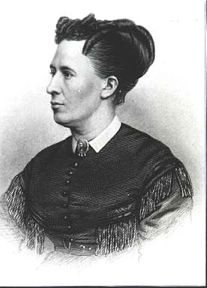 Julia Boggs Dent Grant
Born:
26 January 1826
“White Haven” farm
St. Louis, Missouri
Father:
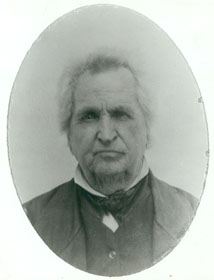 Frederick Fayette Dent, born 6 October 1786, Cumberland, Maryland; died 16 December 1873, the White House, Washington, D.C. Frederick Fayette Dent, born 6 October 1786, Cumberland, Maryland; died 16 December 1873, the White House, Washington, D.C.
Frederick Dent was one of five children between his parents, and also the half-brother of a son by his mother’s first marriage. His father George Dent was the surveyor of what would become Cumberland, Maryland and helped determine the town’s layout. Frederick Dent was born in a loghouse, but as family finances improved, it was torn down and replaced by a brick structure. Although he had no formal education, Frederick Dent was successful as a merchant early in life, leaving Cumberland in 1806 as an apprentice to David Shriver, who surveyed and cleared the land for the creation of a national road from Cumberland to what is now Wheeling, West Virginia. At some point shortly thereafter, he moved to Pittsburgh, Pennsylvania, where he met his future wife.
After relocating to Missouri Territory in 1816, he formed a partnership with George W. Rearick and later with Edward Tracey in St. Louis. His firm thrived to the point where he was able to retire as something of a country squire when Julia Dent was still young. He successfully invested in the purchase of one of the earliest known commercial steamboats, and employed it to begin trading along the Mississippi River, transporting such goods as coffee and sugar from New Orleans. Although he held no military rank, he took on the moniker of colonel, suggesting a southern plantation slave owner.
Mother:
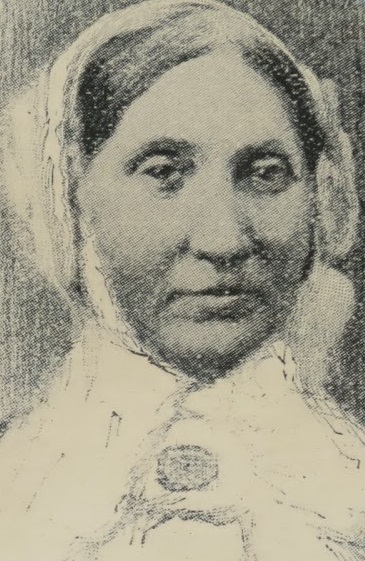 Ellen Bray Wrenshall, born April 1793, Lancashire, England; married 22 December 1814, Pittsburgh, Pennsylvania; died 14 January 1857. Ellen Bray Wrenshall, born April 1793, Lancashire, England; married 22 December 1814, Pittsburgh, Pennsylvania; died 14 January 1857.
Ellen Wrenshall immigrated to the United States with her parents, six sisters and one brother, according to her daughter, “at a very early age,” although the exact year is unknown. Her father John was a successful merchant of the British exporting firm Wrenshall, Peacock & Pillon, which primarily drew its profits by importing ginseng root to China. The family settled in Philadelphia. Although she grew up in a wealthy household, Mrs. Grant’s mother lived a socially restricted childhood, dictated by the rigorous adherence to Methodist principals which forbid dancing, card-playing and any alcohol consumption. She nevertheless received a finishing-school education in Pittsburgh, Pennsylvania, the name of which is unknown. One of the highlights of her younger years was being given shelter by Aaron Burr and his militia at an Alleghany Mountain tavern as she travelled from school back home to Philadelphia.
In 1816, Julia Dent’s parents and their first child relocated from Pittsburgh to what was then a frontier country known as “Upper Louisiana,” which became St. Louis, Missouri, making the trip by flatboat and carriage.
Birth Order and Siblings:
Fifth of eight, four brothers, three sisters; John Cromwell Dent (1816-1889); George Wrenshall Dent (1819-1899); Frederick Tracy Dent (1820-1892); Louis Dent (1823-1874); Ellen “Nellie” Wrenshall Dent [Sharp] (1828-1885); Mary Dent (1825, died in infancy); Emily “Emma” Marbury Dent Casey (1836-1920)
Ancestry:
All of Julia Dent Grant’s ancestors were English in origin. Her paternal grandfather’s ancestor was Thomas Dent of Yorkshire, England, who immigrated in 1643 and settled near what would become the Washington, D.C. area, in Bladensburg, Maryland; her paternal grandfather George Dent was born there. Julia Grant claimed that her paternal grandmother’s name was Susanna Marbury and that her ancestors were wealthy landowners from Cheshire, England who made their home at an estate called Marburg Hall. This conflicts with several detailed genealogical records that indicate that her paternal grandmother was born as Susannah Dawson, and was the widow of a Joseph Dawson. Julia Grant did not seem to have invented this more aristocratic aspect of her ancestry, however, for she possessed an engraving of Marbury Hall on the assumption that it was an ancestral home, and one of her sisters was given the middle name of Marbury. After their marriage, her paternal grandparents George Dent and Susannah Dawson Cromwell relocated to Cumberland, Maryland. Julia Grant’s mother was an English immigrant. (see “Mother” entry above)
Religion
Methodist. Throughout her entire life, Julia Dent Grant was a regular church-goer and made an effort early on to ensure her children received a religious education. She did not, however, ever refrain from some of the “worldly” pleasures such as alcohol consumption, dancing, and gambling either through betting at horse races and card-playing, which the strictest adherence to the faith insisted upon.
Childhood Home:
Shortly before Julia Dent’s birth, her parents purchased a spacious wood clapboard house, intended to serve as a summer home. Located about ten miles south of St. Louis in a heavily one-thousand acre wooded area through which ran Gravois Creek, Frederick Dent named it “White Haven,” after one of his alleged ancestral homes in England. Dent made it a working farm, and purchased one of the region’s first crop thresher machines, drawing crowds of curious locals to see the new invention in action. Various working animals on the farm were imported, such as donkeys from Malta, and pigs from China.
Education:
The Gravois School, St. Louis, Missouri, (approximately 1831-1836).
Details about the institution where Julia Dent received her first formal education are sparse. Described as a one-room schoolhouse made of logs, there were at least four male instructors, two of whom had been trained for higher education. One of the teachers was John F. Long, a farmer and neighbor of the Dents and later a friend to Ulysses Grant as well. Julia Grant remembered more about the classroom being divided between boys and girls and older and younger students, the fireplace and flowers inside and the playground outside, than she did about any of her studies.
Mauro Academy for Young Ladies, St. Louis, Missouri, (1836-1843).
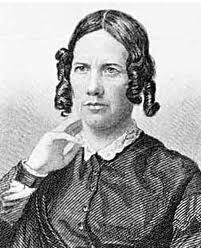 Attending this private girls school in downtown St. Louis from the age of ten until seventeen meant that Julia Dent was a boarding student during the week, returning home to White Haven on weekends, usually escorted by a teacher or older student who remained as guests until returning to the city Run by a Mr. P. Mauro and his daughters, the school was located at Fifth and Market Streets. By her own account, Julia Dent “devoted” herself to history, mythology, and philosophy, disliked grammar, mathematics, and was “below the standard” in all other subjects. She later stated that she was permitted to “select my own studies” at the Moreau School. Attending this private girls school in downtown St. Louis from the age of ten until seventeen meant that Julia Dent was a boarding student during the week, returning home to White Haven on weekends, usually escorted by a teacher or older student who remained as guests until returning to the city Run by a Mr. P. Mauro and his daughters, the school was located at Fifth and Market Streets. By her own account, Julia Dent “devoted” herself to history, mythology, and philosophy, disliked grammar, mathematics, and was “below the standard” in all other subjects. She later stated that she was permitted to “select my own studies” at the Moreau School.
During her latter school years, Julia Dent developed a lifelong passion for voraciously reading novels. Apart from her early formal education, she also learned the literature of classic literature and poetry from readings by her mother. However, she especially credited her brother Louis, to whom she was closest among her four brothers, for engaging her in reading and reciting the works of Shakespeare and Byron.
Life before Marriage:
Skilled at the piano, Julia Dent enjoyed playing music and singing in accompaniment to traditional Scottish ballads and contemporary compositions popular in the southern states. She also displayed a degree of artistic skill in various forms. She was an accurate at capturing images in hand-drawn sketches, even devising the basic configuration of their “Hardscrabble” cabin.
While Julia Grant later recalled her mother as a loving and sweet presence, it was her father’s first cousin Ruth Caroline Schutz O’Fallon, a Baltimore heiress whose stylish home was in St. Louis who inculcated her in the finer points of social life among the elite. “Society” was an important aspect of her life from young adulthood until her death.
Her father’s politics were shaped by his economic fortune, which was based in slavery. Frederick Dent retained about thirty enslaved African-Americans and refused to consider freeing them on moral ground, doing so only when compelled by law of emancipation. His anti-abolitionist principals also guided his political loyalty to the Jacksonian wing of the Democratic Party and rabidly anti-Whig and then anti-Republican.
As would be true with even the more difficult periods of her life, Julia Dent Grant left highly colorful, idealized recollections of her early years. The nature of the Dent household was highly social, with White Haven visitors coming from among the elite class of Cincinnati, Louisville and Pittsburgh. Frederick Dent also counted Missouri Territorial Governor William Clark, one of two principals of the famous Lewis and Clark Expedition to the west, and Alexander McNair, the first state governor of Missouri, among his close friends; thus Julia Dent Grant was familiar and comfortable with powerful political figures early in life.
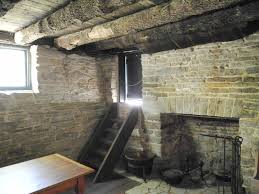 By her own admission, Julia Grant had been greatly indulged by her parents yet maintained that she was not spoiled. Her brothers often included her in activities such as fishing, and hunting of squirrel, foxes, rabbits, quail, grouse, pheasant, geese, ducks, turkeys, crane, doves, plover and woodcocks. She was also an expert horsewoman, especially attached to her horse Psyche, and would remain devoted to both riding and attending horse races for the rest of her life. By her own admission, Julia Grant had been greatly indulged by her parents yet maintained that she was not spoiled. Her brothers often included her in activities such as fishing, and hunting of squirrel, foxes, rabbits, quail, grouse, pheasant, geese, ducks, turkeys, crane, doves, plover and woodcocks. She was also an expert horsewoman, especially attached to her horse Psyche, and would remain devoted to both riding and attending horse races for the rest of her life.
Frederick Dent had brought to Missouri from Maryland a number of slaves, and later purchased others, holding nearly twenty African-Americans in bondage as property in the 1850s. The First Lady claimed to believe that “our people,” meaning the Dent slaves, were “very happy,” and that only at the onset of the Civil War did the younger generation of slaves become “somewhat demoralized,” claiming either willfully or naively that it was their reaction to “all the comforts of slavery” ending with emancipation. She referred to the older generation of African-American as her “aunts” and “uncles” and recalled that she often interceded on their behalf to obtain small amounts of money, tobacco, sugar and other amenities.
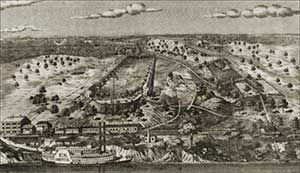 Upon her graduation from the Mauro Academy, Julia Dent often visited schoolmates at their homes in St. Louis or the Jefferson Barracks, a U.S. Army base located about halfway between St. Louis and White Haven. The maturing Miss Dent came to meet many young officers, becoming especially acquainted with those who came to visit her brother Fred, an officer, during his periods on leave from Fort Towson in Indian Territory. Upon her graduation from the Mauro Academy, Julia Dent often visited schoolmates at their homes in St. Louis or the Jefferson Barracks, a U.S. Army base located about halfway between St. Louis and White Haven. The maturing Miss Dent came to meet many young officers, becoming especially acquainted with those who came to visit her brother Fred, an officer, during his periods on leave from Fort Towson in Indian Territory.
During his education at West Point Academy, Fred Dent wrote his sister Julia about how impressed he was with a fellow student, Ulysses S. Grant. “I want you to know him,” he wrote his sister, “he is pure gold.” Fred Dent had also spoken to Grant about his sister. In 1844, as a young lieutenant Grant began to routinely visit the Dent family at White Haven. 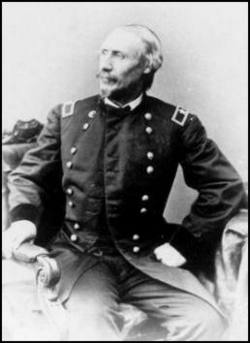 In April of that year, he made what seemed like another routine call, but sat outside on the porch with Julia Dent, rather than her brother, and asked her to accept and wear his class ring, as a sign of their exclusive affection. Eighteen years old at the time, she initially demurred from accepting. Grant’s regiment was then ordered to Louisiana, in preparation for service in the Mexican War. Distraught at their separation, Miss Dent had an intense dream, which she detailed to several people, that Grant would somehow return within days, wearing civilian clothes and state his intention of staying for a week. In April of that year, he made what seemed like another routine call, but sat outside on the porch with Julia Dent, rather than her brother, and asked her to accept and wear his class ring, as a sign of their exclusive affection. Eighteen years old at the time, she initially demurred from accepting. Grant’s regiment was then ordered to Louisiana, in preparation for service in the Mexican War. Distraught at their separation, Miss Dent had an intense dream, which she detailed to several people, that Grant would somehow return within days, wearing civilian clothes and state his intention of staying for a week.
Despite the seeming impossibility of this, circumstances permitted Grant to return precisely as Julia had dreamed he would. It was but the first example of a lifetime of dreams and other extra-sensory perception experiences by which she often found comfort or made decisions of calculable risk. During this period, Grant declared his love for Miss Dent. Claiming she would not mind being engaged to him without committing to marry him, it was enough of an assurance that Grant approached her father for permission to marry.
Colonel Dent made clear his personal affection for Grant, but expressed the belief that Julia had been accustomed to a comfortable lifestyle and would be unable to adapt to the rigor of the harsh and unpredictable life that being married to a career military husband would require. Grant declared that he was so determined to marry Julia Dent that he would accept an offer made to him of becoming a professor of mathematics at a Hillsboro, Ohio college. Dent suggested he remain in the U.S. Army and that he and Julia wait for about two years before reconsidering marriage. As
events would prove, it would be four years, not until 1848 as Grant returned from his service in the Mexican War that the couple again saw each other.
During the period of her long separation from Grant, Julia Dent did not deny herself the harmless flirtations of responding to young men who serenaded her and her sister Ellen outside of their windows. Nevertheless, she and Grant maintained an intense correspondence, Grant often composing his letters from his tent on the battlefields. When once there was a period of a month when she received no letter, Julia Dent had another dream that her name appeared in a newspaper listed as being the recipient of letters without a proper address – and like her previous dream related to Grant, it proved true.
In late July of 1848, Grant returned from the war and suggested to Julia that they marry as soon as possible. After waiting four years, Julia Dent was eager to comply.
Marriage:
22 years old, married 22 August 1848, St. Louis, Missouri, to Hiram Ulysses Grant born 27 April 1822, Point Pleasant, Ohio, died 23 July 1885, Mount McGregor, Saratoga Springs, New York. Contrary to wide belief, Grant’s middle name was not “Simpson,” and he later confessed that his taking of the middle initial of “S.” was merely an affectation. Grant had graduated from West Point on 1 July 1843, ranked twenty-first in a class of thirty-nine. At the time of the marriage, he held the rank of brevet second lieutenant. During the Mexican War, he served as quartermaster.
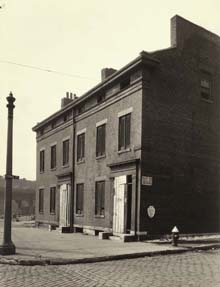 The Dent-Grant wedding took place at the Dent family home in St. Louis on the corner of Cerre and Fourth Street. Since many of her friends were out of the city due to the summer heat, the wedding was small, but elegant. Although she had intended on wearing a simple and light Indian muslin gown for the ceremony, Julia Dent was delighted at the gift of an elegant watered silk white wedding gown and veil of white fringed tulle, presented by her O’Fallon relatives. There was a lavish wedding cake, music and refreshments. Among the groomsmen were several men who would go on to fight against Grant as Confederate officers. The Dent-Grant wedding took place at the Dent family home in St. Louis on the corner of Cerre and Fourth Street. Since many of her friends were out of the city due to the summer heat, the wedding was small, but elegant. Although she had intended on wearing a simple and light Indian muslin gown for the ceremony, Julia Dent was delighted at the gift of an elegant watered silk white wedding gown and veil of white fringed tulle, presented by her O’Fallon relatives. There was a lavish wedding cake, music and refreshments. Among the groomsmen were several men who would go on to fight against Grant as Confederate officers.
Noteworthy for their absence were any members of the groom’s family. Extremely religious and vehement abolitionists, his parents Jesse and Hannah Grant did not approve of their son marrying into a family that held human beings as property. While there is no indication of any open confrontation between Grant’s parents and his wife, the lack of any effort by the senior Grants to even grudgingly express affection for their new daughter-in-law was a hurt she never forgot. According to the “Ulysses S. Grant homepage,” Grant’s letters to his father were “sometimes curt and show disapproval for his condescending attitude towards his wife, Julia, and his miserly habits when she visited.” Despite such documentation, Julia Grant left a conflicting record of their first encounter, claiming that Jesse Grant treated her “cordially,” and that Hannah Grant offered her “an affection welcome.”
The newlyweds took a three-month honeymoon excursion by riverboat and stagecoach, stopping in Louisville and then travelling through Ohio to the home of his parents and other relatives. During a visit at the lavish home of a Grant cousin, Julia Grant was impressed by how modestly her new husband suggested to a number of prominent and successful export merchants there that he would welcome a chance to enter one of their enterprises since such a business profession could provide a more financially stable life for his new wife. She was stung by the fact that none of them made any overture to help Grant and, further, that in later years she was compelled to treat politely some of these same individuals who then pressed her for favors at the direction of her then-prominent husband.
The attraction between Ulysses and Julia Grant was intense and lifelong. All documentation suggests that his mother Hannah Grant was extremely detached from her son, offering no emotional support to him. In contrast, Julia Grant provided a deep well of unconditional love and support to him. She had a series of affectionate nicknames for him, such as “Victor” (as in always the winner), Dodo, and Dudy. By conventional standards, Julia Dent Grant was often described as plain, due largely to her crossed eyes. Highly self-conscious about this physical defect, in later years she scheduled an appointment for surgery to correct it until her husband gently reminded her that he had fallen in love with her despite the appearance of her eyes. The remark convinced her to remain as she was, reminded of the secure love of her husband.
Children:
Three sons, one daughter: Frederick Dent Grant (30 May 1850 – 1912); Ulysses S. “Buck” Grant, Jr. (22 July 1852 – 1929), Ellen Wrenshall “Nellie” Grant [Sartoris] (1855 – 1922) Jesse Root Grant (1858 – 1934)
The Grant children were highly indulged with love and forgiveness, especially by their father. Horace Porter, staff officer to General Grant, later recalled that Nellie and Jesse “would hang around his neck while he was writing, making a terrible mess of the papers, and turn everything in his tent into a toy.”
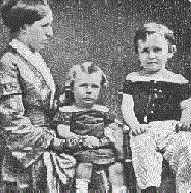 Although she too indulged her children, it was Julia Grant who ultimately had to control and guide their children, turning to her husband as a last resort. As she would recollect: “The General had no idea of the government of the children. He would have allowed them to do pretty much as they pleased…Whenever they were inclined to disobey or question my authority, I would ask the General to speak to them. He would, smiling at me, and say to them, “…you must not quarrel with Mama. She knows what is best for you and you must always obey her.” Although she too indulged her children, it was Julia Grant who ultimately had to control and guide their children, turning to her husband as a last resort. As she would recollect: “The General had no idea of the government of the children. He would have allowed them to do pretty much as they pleased…Whenever they were inclined to disobey or question my authority, I would ask the General to speak to them. He would, smiling at me, and say to them, “…you must not quarrel with Mama. She knows what is best for you and you must always obey her.”
Julia Grant was affectionate and close to all of her children, never showing preference for one over the other. She named them after her mother and father, her husband and father-in-law, nicknaming the second one “Buck” to honor the fact that he was born in Ohio, the “Buckeye State.” Apart from their formal education, she provided them with a unique venue of teaching, giving them daily lessons about each object they used, detailing for them how wood furniture was from trees in Central America, glass from the sand of beaches, and wool blankets from lambs.
Life After Marriage:
Following her marriage, Julia Grant’s life was dictated by her husband’s military career. When faced with the prospect of forever leaving the home of her beloved father and childhood home, however, she experienced great anxiety until Colonel Dent suggested that the only alternative was to continue living with him while her husband returned only on leave of absence once or twice a year. Proving unacceptable to her, her husband finally asked Julia to never again express sadness at parting from her father since it made Grant unhappy to see her in such a state. The absolute faith in her husband’s abilities never wavered and it is no understatement to credit Julia Grant for the more ephemeral aspects of what would lead to her husband’s success in his public roles as General and President. Uncertain and hesitant, Ulysses S. Grant often retreated into himself; Julia Grant just as often strove to engage him. After his wife organized a Mardi Gras masquerade ball early in their marriage, for example, he would only appear in his uniform while she invested an enormous amount of energy into her costume as a gypsy. Observing her enthusiasm, he was prompted to go out and purchase a tambourine to complete her outfit, and nicknamed her “Tambourina” for a time.
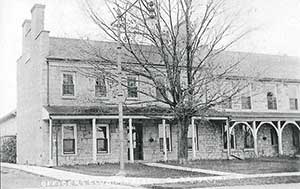 In November of 1848, the couple relocated to the Detroit, Michigan, where Grant was stationed with the Fourth Infantry. Their first home there was the Michigan National Hotel but by the spring of 1849 they had managed to buy a small wood frame house at 253 East Fort Street. After a brief return home to St. Louis to give birth to her first son, the couple and their child shared quarters in the barracks with another couple. Based close enough to make regular visits to Grant’s sister Clara, the period also marked her first excursions by railroad. They would live here until 1852, although Julia Grant would make numerous visits back to St. Louis, where her first child was born, and White Haven. While there, Mrs. Grant also attended lectures given by women’s rights advocate Frederika Brewer and politician William Seward. In November of 1848, the couple relocated to the Detroit, Michigan, where Grant was stationed with the Fourth Infantry. Their first home there was the Michigan National Hotel but by the spring of 1849 they had managed to buy a small wood frame house at 253 East Fort Street. After a brief return home to St. Louis to give birth to her first son, the couple and their child shared quarters in the barracks with another couple. Based close enough to make regular visits to Grant’s sister Clara, the period also marked her first excursions by railroad. They would live here until 1852, although Julia Grant would make numerous visits back to St. Louis, where her first child was born, and White Haven. While there, Mrs. Grant also attended lectures given by women’s rights advocate Frederika Brewer and politician William Seward.
There followed a brief re-assignment during the winter of 1848-1849 to the Madison Barracks at Sackets Harbor, New York, and then again in the fall and winter of 1851-1852. For Julia Grant, it was a happy period, particularly since it permitted her to indulge a love of dancing at social events. Since it was peacetime, her husband had much free time and took up his lifetime love of card-playing. Despite both being raised as Methodists, they ignored the faith’s stricture against dancing and card-playing. During this period, Julia Grant also learned to manage her own household, hosting her first dinner party with considerable anxiety, and taking pride in furnishing their home on a small budget.
While Julia Grant readily accepted the traditional division of marital responsibility by running their home, she was also conscious of how often wives had unthinkingly exceeded the means of a husband’s salary. At Madison Barracks, she first requested that Grant provide her with a regular allowance on which she would meet the expenses of their household, an arrangement to which he agreed. Julia Grant then began keeping her own financial account books. Although she confessed to a great deficit in her ability with anything mathematical and often failing when it came to precise accuracy, she would persist in maintaining their financial records, whether they were wealthy or poor, and continued to do so until her death.
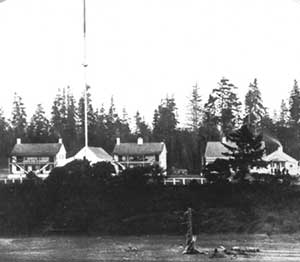 In 1852, with the rank of captain, Grant was assigned to Humboldt Bay, California on the Pacific Ocean. The distance prevented Julia Grant from joining him and the two years of separation were especially torturous for him, leading him into long bouts of depression and, some sources suggest, heavy drinking. It was a period when his emotional health especially depended on the love and faith in him that Julia expressed in her letters. In later years, Julia Grant would vociferously maintain that her husband did not develop an alcohol dependency while stationed in California. However, she may have crafted her words carefully to avoid an outright denial of his condition during their two year separation, chronicling only her feelings of being “indignant and grieved” by statements suggesting Ulysses Grant was “dejected, low-spirited, badly-dressed and even slovenly.” In 1852, with the rank of captain, Grant was assigned to Humboldt Bay, California on the Pacific Ocean. The distance prevented Julia Grant from joining him and the two years of separation were especially torturous for him, leading him into long bouts of depression and, some sources suggest, heavy drinking. It was a period when his emotional health especially depended on the love and faith in him that Julia expressed in her letters. In later years, Julia Grant would vociferously maintain that her husband did not develop an alcohol dependency while stationed in California. However, she may have crafted her words carefully to avoid an outright denial of his condition during their two year separation, chronicling only her feelings of being “indignant and grieved” by statements suggesting Ulysses Grant was “dejected, low-spirited, badly-dressed and even slovenly.”
Finally, in August of 1854, he resigned from the U.S. Army and returned to his wife. Over the next four years, Grant farmed about sixty-acres of a hundred-acre property given him and Julia by her father as a wedding present, his primary income coming from selling cordwood. His wife insisted that Grant was “very successful” at farming, conceding only that it was “not as much as he anticipated from his calculations.” For her part, Julia Grant took charge of their large flock of chickens, yielding enough eggs and meat to keep their family well-fed. Although she was reluctant to ever detail the extent of the financial desperation of these years, her husband mentally suffered at the bleak future he foresaw for him and his family. While living in the home of her parents, Frederick Dent often openly belittled his son-in-law as a failure. Julia Grant and her mother, maintained great confidence in his future, both believing he would go on to greatness. In fact, Mrs. Grant remarked, “"But we will not always be in this condition. Wait until Dudy [her nickname for him at the time] becomes President." One observer at the time noted, "no man enjoyed a sweeter domestic felicity his supreme happiness centered in his home."
Although residing in a furnished Dent family house originally built for her brother Lewis, which the Grants dubbed “Wish-ton-wish,” it was a distance from the farm. Grant also built a log house which was nearer the fields, which the family dubbed “Hardscrabble” a reference to the seeming impossibility of surviving by farming. Mrs. Grant confessed to it being, “crude and homely,” and further confessed to falling into what she termed the “deepest despondency.” Again Julia Grant claimed that her ESP provided her with confidence of the family’s survival, calling out loud “Is this my destiny? These crude, not to say rough surroundings; to eat, to sleep, to wake again and again to the same.” To this, she continued, a “silvery light” above her, delivering the response that it was not her destiny, and to “be happy now.” She claimed that, despite even more financial crises ahead, she was never again to suffer from depression. She successfully argued against her father-in-law’s continued efforts to lure her husband into the tanning business in Kentucky because it would mean his separation from her and their children.
In desperation, Grant entered a real estate partnership with his wife’s cousin Harry Boggs in St. Louis, but failed at this occupation, often unable to appear on time for appointments and reluctant to press leasers for their rent.
Finally, in May of 1860, Ulysses and Julia Grant relocated to Galena, Illinois where he takes a position as clerk in his father’s tannery shop and the family moved into a small but comfortable house.
The circumstances were less than ideal for another reason. Grant’s father rigidly disapproved of what he considered to be the lavish and wasteful lifestyle of his daughter-in-law, and despite his relatively great wealth, he refused to provide them with anything but the most minimal and gratuitous of support.
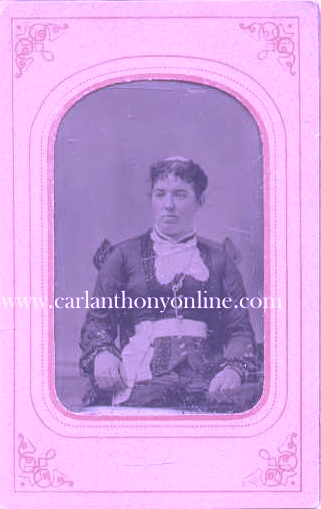 As a woman, Julia Grant never received the right to vote, but did consider herself a political partisan. In the years leading up to the Civil War, she empathically stated, “I was a Democrat,” having been firmly inculcated by her father in the party’s foundational premise of states rights. At the time, she was not above arguing politics with Republican men she encountered in Galena, Illinois, defending the character of Kansas Territory Governor Samuel Medary. She became engaged in intellectual debate during the 1860 presidential election as the issue of secession arose, but soon developed a political ambivalence, led less by partisan loyalty and more by what she considered fair, believing in a state’s right to secede yet the necessity of the federal government to take action to prevent this. During the campaign, Ulysses Grant, she recalled, “read along to me every speech for and against secession.” As a woman, Julia Grant never received the right to vote, but did consider herself a political partisan. In the years leading up to the Civil War, she empathically stated, “I was a Democrat,” having been firmly inculcated by her father in the party’s foundational premise of states rights. At the time, she was not above arguing politics with Republican men she encountered in Galena, Illinois, defending the character of Kansas Territory Governor Samuel Medary. She became engaged in intellectual debate during the 1860 presidential election as the issue of secession arose, but soon developed a political ambivalence, led less by partisan loyalty and more by what she considered fair, believing in a state’s right to secede yet the necessity of the federal government to take action to prevent this. During the campaign, Ulysses Grant, she recalled, “read along to me every speech for and against secession.”
With the outbreak of the Civil War, Grant determined to return to active military service as an officer of the U.S. Army. While he was away, unsuccessful in his effort to meet with Union General George McClellan in pursuit of a commission, it was Julia Grant who opened his mail to discover that he had been reinstated as a colonel by the state of Illinois to return to the U.S. Army with the 21st Illinois infantry. Two months later, President Abraham Lincoln commissioned Grant as a Brigadier General.
The Civil War:
Role in Grant’s Military Career:
The marriage of Julia Dent and Ulysses Grant offers as unique a glimpse into the conflicts and challenges faced by couples of the mid-19th century who came from the two contrasting cultures of North and South. While similar in this respect to the union of Abraham and Mary Lincoln, the Grant marriage nevertheless provides a more dramatic context. Unlike Mary Lincoln who renounced her Confederate relatives, Julia Grant remained close to her slave-owning father and family members who supported the Confederacy. She did so at the very time that her husband was leading a war that accumulated an astronomical number of deaths to them as well as the Union Army that he led. Without apology for her family’s Confederate viewpoint, she was steadfast in her loyalty to her husband and the Union Army, a testament perhaps to her naturally diplomatic gifts. It was not a matter merely of shifting her remarks based on the views of people she encountered on either side of the conflict but her very presence in Union Army camps, to serve as ballast for her husband as he sought to remain emotionally steady through a rigorous sense of purposeful duty that was nevertheless traumatic.
In the initial phase of the Civil War, Julia Grant was uncertain about her role, feeling the need to volunteer with other Galena, Illinois women supporting the Union Army, but admitting to her lack of success when assigned to simply knit a pair of soldier socks in a week’s time.
Ultimately, Julia Grant’s most vital role during the Civil War was to provide a strong and constant flow of support to her husband. She did this by her physical presence with him at camp headquarters and, when apart, generating and replying to correspondence and taking actions such as making rental and financial arrangements, managing their property, and overseeing the education of their children. This provided General Grant with assurance of his fullest capacity for leadership and relief from anxiety over the well-being of his finances and family, permitting him to focus on his career and military tactics, as he rose through the ranks to head the Union Army and led it to victory.
Grant’s first military action as a Brigadier General occurred in November of 1861 at the Battle of Belmont, leading a raid on a Confederate encampment. Although his forces were forced to retreat, proved to be important to him as a lesson to trust his gift for military crucial experience for Grant, guiding his natural gift for military tactics. Julia Grant was not with him during this period but kept fully abreast of every battle move in a highly detailed letter from him. She would remain informed of the slightest movements of any military action in which he was involved, wisely determining not to depend merely upon his letters reporting his most recent moves, which could be long delayed or intercepted dependent not only through his initial. Subscribed to the St. Louis Democrat, however, Julia Grant was able to follow the military movement of her husband, the newspaper having a correspondent embedded in Grant’s brigade and reporting on his every movement.
Where she would remain based with their children during the war remained an issue subject to her access to her husband at base camp. Initially, she and the children briefly lived in Covington, Kentucky with his family, but then returned to their Galena, Illinois home.
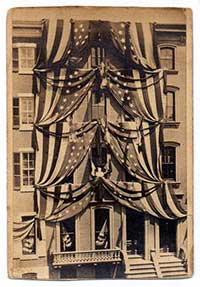 As the war proceeded and Grant’s fame rose, the couple determined that Philadelphia would be safest place for them to consider a home base and ensure the continuity of their children’s educations; the matter of where they would live in that city was solved when wealthy members of the Philadelphia Union Club gave them an outright gift of a fully-furnished Chestnut Street home in that city, worth about $30,000. It not only spared the general’s wife the anxiety of finding and leasing a home but also proved to be a central asset in the family’s financial security. As the war proceeded and Grant’s fame rose, the couple determined that Philadelphia would be safest place for them to consider a home base and ensure the continuity of their children’s educations; the matter of where they would live in that city was solved when wealthy members of the Philadelphia Union Club gave them an outright gift of a fully-furnished Chestnut Street home in that city, worth about $30,000. It not only spared the general’s wife the anxiety of finding and leasing a home but also proved to be a central asset in the family’s financial security.
Grant proved his brilliance by leading a victory on Fort Donelson, Tennessee, the first Union Army strategic success. His actions at Fort Donelson thrust Grant into national headlines, as does his stated intention for how the war will end: “No terms except immediate and unconditional surrender.” As a result, Grant was given the rank of a two-star Major General.
Union Loyalty, Confederate Sympathy:
In a manner not dissimilar to what was experienced during the war by First Lady Mary Lincoln, a Kentucky native but First Lady of the Union, southern friends of Mrs. Grant verbally challenged the authenticity of her Union loyalty by revealing that they knew how to defy Union law and have their mail delivered to those living in the Confederacy, making it a dare for her to report it – which she did not. Her friendly trust of Confederate women she encountered in Mississippi, as well as her naïve decision to travel with one of her slaves and permit herself to be exposed to their negative anti-Union songs, seemed to only give credence to their charge that Mrs. Grant was with the Confederacy “in feeling and principle.”
From the moment he decided to enter the army as a matter of principled conviction that the southern states had no right to secede from the United States, her support was firm. "Julia takes a very sensible view of the present difficulties,” Grant wrote to his father at the time, “She would be sorry to have me go, but thinks the circumstances may warrant it and will not throw a single obstacle in the way."
Julia Grant held to this conviction knowing that it could irreparably damage her intensely close relationship with her father. Grant wrote to Colonel Dent, rationally explaining his decision to side with the Union, stating plainly that, “now is the time, particularly in the border slave states for men to prove their love of country. I know it is hard for men to apparently work with the Republican Party but now all party distinctions should be lost sight of, and every true patriot be for maintaining the integrity of the glorious old Stars and Stripes, the Constitution and the Union. the Southerners have been the aggressors.”
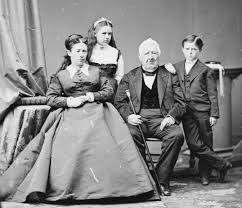 Her father, however, conceded nothing on the matter, badgering Grant that he could much more easily enter the fray with higher military rank if he joined the Confederate Army. Grant refused, so enraging Fred Dent that he sharply retorted, "Send Julia and the children here. As you make your bed so you must lie." It was a testament to the couple’s commitment to each other that they never wavered, though the loss of previously close family relationships was devastating. "If you are with the accursed Lincolnites,” one of Grant’s aunts wrote them, “the ties of consanguinity shall be forever severed." Her father, however, conceded nothing on the matter, badgering Grant that he could much more easily enter the fray with higher military rank if he joined the Confederate Army. Grant refused, so enraging Fred Dent that he sharply retorted, "Send Julia and the children here. As you make your bed so you must lie." It was a testament to the couple’s commitment to each other that they never wavered, though the loss of previously close family relationships was devastating. "If you are with the accursed Lincolnites,” one of Grant’s aunts wrote them, “the ties of consanguinity shall be forever severed."
It was a tribute to Mrs. Grant’s considerable exercise of charm that she was able to maintain her absolute loyalty to her husband during the Civil War while avoiding an outright breach with her father. Other family members of both of the Grants declared themselves permanently estranged from the couple because of their Union loyalty. Whenever Unionists verbally attacked the South in her presence, Julia Grant disciplined herself to remain silent.
Slavery:
It is unclear whether the African American servants who continued to work for Julia Grant throughout the Civil War had been given their freedom and were being paid or whether they were still held in bondage. The Emancipation Proclamation exempted the state of Missouri where they had been originally registered as her property. Grant scholar John Y. Simon believed that Mrs. Grant continued to hold as >personal property the four slaves she had been given by her father, identified only by their first names of Eliza, Dan, Julia and John as property until they were granted their freedom by passage of the 13th Amendment in 1865. Although they would be legally granted immediate freedom while residing in residents in the Galena, Illinois of the Grants, none of the four slaves sought to break from the family.
During her initial stays at her husband’s headquarters, Mrs. Grant ‘s slave, named Julia, accompanied her; they worked alongside each other as nurses in Union Army hospitals. Mrs. Grant’s father, however, had warned her that doing this would mean that anywhere within Union-held territory, her slaves would be considered free and that she risked losing the free labor she depended upon by doing this. 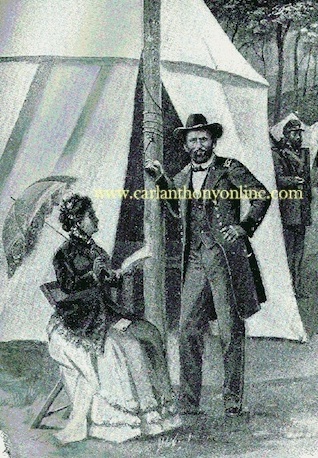 Ignoring his advice, Mrs. Grant experienced precisely what he’d predicted when her enslaved companion Julia ran for freedom and escaped, in Union-held Jackson, Mississippi. Ignoring his advice, Mrs. Grant experienced precisely what he’d predicted when her enslaved companion Julia ran for freedom and escaped, in Union-held Jackson, Mississippi.
For General Grant, leading a military force which, at its widest intent, also sought to eradicate slavery after the Emancipation Proclamation was enacted, his wife’s loss was actually a relief of what was becoming not only a moral dilemma for him, but overt hypocrisy. For her part, however, Julia Grant never did express remorse for holding human beings as property.
In Camp:
Longing for her presence at his side, Grant initially considered having Julia join him at camp in Kentucky, in September of 1861. As with all his decisions regarding her wartime movement, however, he refused to indulge his compulsion to be with her when safety was a factor. Her first presence in camp took place at the end of November of 1861, at Cairo, Illinois, broken only by a brief but trying visit back to her father in St. Louis. She remained at Cairo until the end of January of 1862, after which she moved with her children to the Covington home of her in-laws.
In the spring of 1862, following the Battle of Shiloh, Julia Grant again returned to her husband’s base camp, this time in Corinth, bringing along all of their children. She repeatedly settled, then picked up again, depending on the movement of his headquarters, making a home in any livable space, be it an inn, a confiscated Confederate home, a log barrack or a canvas tent.
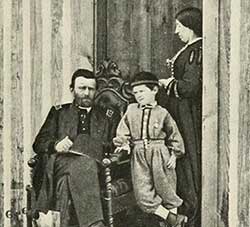 After a retreat to the senior Grant home in Covington, she returned to join Ulysses in October of 1862 at Jackson, Mississippi. While here, her enslaved woman servant Julia escaped, running to freedom. General Grant was, in fact, pleased about this, a relative recalling that he "wanted to give his wife's slaves their freedom as soon as he was able." After a retreat to the senior Grant home in Covington, she returned to join Ulysses in October of 1862 at Jackson, Mississippi. While here, her enslaved woman servant Julia escaped, running to freedom. General Grant was, in fact, pleased about this, a relative recalling that he "wanted to give his wife's slaves their freedom as soon as he was able."
Grant did specifically locate his headquarters at Nashville, Tennessee following the Battle of Vicksburg, so that Julia Grant could come live with him there in relative comfort. The day she arrived, however, he was away and didn’t return for many hours. With “a great deal of sorrow” he then informed her that he had to immediately go to the war front and would thus be unable to live there with her for five long days. His leaving upon her immediate arrival provoked gossip among Confederate women, suggesting that it was Julia Grant who had insisted upon being with her husband, provoking him to flee. Both were amused, rather than insulted by this, Grant telling her to point out that he had “put my headquarters here just on purpose to have you with me.”
It was always in response to General Grant’s imploring that his wife came to him, and always for a period and at a base camp that he determined was relatively safe. Even if he foresaw that a chance for their reunion would only prove brief, he implored her to join him. “I do not know what I may be called on for next, supposing that I am successful here, “ her wrote her in 1863 from Mississippi before the Battle of Vicksburg,” but you can at least join me until I am compelled to go elsewhere.”
Never seeking to conceal her identity and increasingly recognizable due to public distribution of her photograph on the era’s popular carte-de-visite cards, Julia Grant was always susceptible to capture or harm by Confederates.
After joining her husband at Memphis, Tennessee in July of 1862, and then proceeding with him to Corinth, Mississippi, where she remained for a month, she was an easy target in the South. In August, she was stationary for a length of time at Grant’s secondary, supply base camp at Holly Springs, Mississippi, headquartered in the private home of a Confederate family by the name of Walters, which had been seized by Union troops. When Confederate General Earl Van Dorn led a surprise attack on the Union supply camp there, his troops confiscated Mrs. Grant’s horses and burned her carriage although her personal belongings were protected by the wife of captured Confederate soldier Pugh Govan; in gratitude for this, Julia Grant interceded to obtain the release of Govan from a Union prison and her husband issued an order protecting the Walters home from Union Army destruction or raid. It is unclear whether she was present during the raid: some family members claimed she was there, an account conflicting with one left by a Confederate soldier under Van Dorn’s command.
The presence in a war camp of a general’s wife was an unusual decision and did not escape some private disapproval by some of his military staff. Among these, the most important was his aide-de-camp General John A. Rawlins. Eventually he not only became reconciled to her presence in camp but he came to form a strong alliance with her in their joint effort to protect the reputation and career of Grant. She was often even present even during military strategy sessions. Once, cognizant of the confidential maneuvers being discussed by her husband and General John Sherman, she quipped, "Perhaps you don't want me here listening to your secrets?” Trusting her confidence, Sherman nonetheless teased, "Do you think we can trust her, Grant?" to which her husband quipped, "I'm not so sure about that.” After posing a mock-serious battery of military questions, Sherman replied, "Well, Grant, I think we can trust her."
It was also the general who urged his wife to bring their family to live with him whenever it was deemed reasonably safe and at one point his eldest son Fred, then twelve, lived with him in camp during the 1863 battle of Vicksburg. The young man teenager not only witnessed fighting but was grazed by a bullet. As word of the presence of the Grant children in camp went beyond the circle of the Union Army to the general population, each of the children also began to develop a public profile. The dark side was that it made them targets for Confederate kidnapping. One such attempted incident was prevented only when Julia’s sister Emma acted swiftly to relocate her nephew Fred from two strangers asking about his whereabouts.
Growing Fame:
Julia Grant was more pro-active than her husband when it came to the growing press interest in him as an individual, spouse and father. Grant’s rapid rise through military ranks, surpassing many of his compatriots, also led to the revival and circulation of stories about his “former bad habits” of heavy drinking during his desolate years of isolated assignment in California. A kernel of truth was apparently enough for those jealous of his sudden prominence to embellish tales of his alcohol consumption and its resulting affect on him.
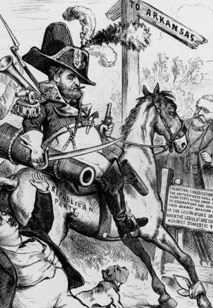 From that point on, until her own death, Julia Grant denied outright that her husband had ever consumed alcohol in any excessive amount. Whether she emphatically stated this for the record knowing it to be the truth, knowing it to be an outright lie or was never fully informed of the fullest extent of his drinking or simply never witnessed him in any suggestion of even its partial truth is unknown. In their post-White House years, while in England, there was an eyewitness account that claimed that Grant had become ill from excessive alcohol consumption and did so in his wife’s presence. From that point on, until her own death, Julia Grant denied outright that her husband had ever consumed alcohol in any excessive amount. Whether she emphatically stated this for the record knowing it to be the truth, knowing it to be an outright lie or was never fully informed of the fullest extent of his drinking or simply never witnessed him in any suggestion of even its partial truth is unknown. In their post-White House years, while in England, there was an eyewitness account that claimed that Grant had become ill from excessive alcohol consumption and did so in his wife’s presence.
Julia Grant’s blanket denial of her husband drinking, however, is the most dramatic example of her genuine belief that he was honest in all his interactions and right in all his decisions, a factor that ultimately proved vital to his confident success as leader of the Union Army leading to military victory over the Confederacy.
As the war went on, Julia Grant wasn’t just concerned with the public image of her husband but that of her own as well. Sensitive to the fact that she her eyes were crossed she began to pose only from a side view for photographs intended for public distribution.
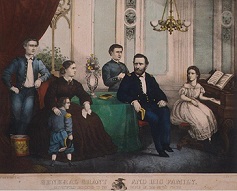 Her photograph, taken in studios was also soon being sold and distributed to the public, sometimes being superimposed with her famous husband. Mrs. Grant never discouraged stories about her husband, herself and their family life. Consequently, by war’s end the American public had a general idea of not just Ulysses and Julia Grant as individuals but their children Fred, Buck, Nellie and Jesse; this was unprecedented for any military figure to that time. Her photograph, taken in studios was also soon being sold and distributed to the public, sometimes being superimposed with her famous husband. Mrs. Grant never discouraged stories about her husband, herself and their family life. Consequently, by war’s end the American public had a general idea of not just Ulysses and Julia Grant as individuals but their children Fred, Buck, Nellie and Jesse; this was unprecedented for any military figure to that time.
Financial Management:
Living as head of her own household also trained Julia Grant in real estate management and transactions. Following the explicit directions on specific prices, acreage and contractual details on land development which Ulysses sent to her, Mrs. Grant oversaw the rental agreements on portions of the White Haven, Missouri property which the couple had, by then, purchased from her father. She also learned to negotiate in successfully collecting on debts owed to her husband.
Influence on Military Matters:
Not wanting to remain idle, Julia Grant immediately joined Confederate women and volunteered as a hospital nurse. Interacting with wounded men from both the Union and Confederate armies, her unfiltered empathy soon enough made her the recipient of requests from people both known and unknown to her, asking her to influence the general into appointing them to various support positions in, or sub-contract offered services to the Union Army. Following her husband’s lead, she refused to entertain these pleas. She adopted a different attitude, however, when it came to interceding on behalf of soldiers or their families from both the Union and Confederate armies who made simple requests that appealed to her. On another occasion, Mrs. Grant successfully interceded on behalf of a soldier convicted of desertion to be punished by hanging. His wife, a new mother who’d convinced her enlisted husband to abandon his post to see the child, came directly to Julia Grant in her camp quarters. She gave entrée to the young woman who directly appealed to General Grant, resulting in the man’s pardon.
The letters he penned Julia Grant from the front were not, she recalled, full of important historical content but rather focused on personal and family matters. She recalled: “The General never talked war matters with me at all. He wrote very little about the war, even after the taking of Vicksburg. I don’t remember that he wrote me any letter of exultation or joy. He was so sorry for the poor fellows who were opposed to him that he could never exult over any victory. He always felt relieved, of course, and glad that it seemed to promise to shorten the war, but he never exulted over them.”
Relationship with Mary Lincoln
Certainly with pride and perhaps with a farsighted ambition for her long-held belief her husband would become President, towards the end of the war, Julia Grant implored her husband to invite the President and Mrs. Lincoln to visit him at his Virginia encampment at City Point. Ignoring his belief that, as commander-in-chief, Lincoln would tour any military installation he wished to, she discovered from First Son Robert Lincoln, then serving as a captain to General Grant, that his parents welcomed an invitation, which they soon received and accepted.
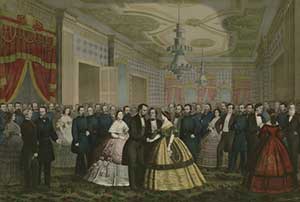 At the time, the public knew little about the tensions that developed between Julia Grant and Mary Lincoln. As the central image of a popular drawing of the “Grand Reception” at the White House on the occasion of Lincoln’s March 1865 second Inauguration, Julia Grant was shown smiling as she shakes hands with the President and the First Lady. At the time, the public knew little about the tensions that developed between Julia Grant and Mary Lincoln. As the central image of a popular drawing of the “Grand Reception” at the White House on the occasion of Lincoln’s March 1865 second Inauguration, Julia Grant was shown smiling as she shakes hands with the President and the First Lady.
Much lore exists about what amounts to a feud in the closing months of the Civil War between First Lady Mary Lincoln and the General’s wife Julia Grant. Their initial meeting took place at Grant’s City Point, Virginia headquarters in March of 1865, when the President and his wife arrived for an inspection tour and stay there.
Rather than express gratitude to Mrs. Grant for encouraging the Lincoln visit, the First Lady was put off by her presence, remarking that she “thought ladies were not allowed in camp.” To this, Mrs. Grant smilingly replied, “General Grant is much opposed to their being present, but when I wanted to come I wrote him a nice, coaxing letter, and permission was always granted.” Mrs. Lincoln, however, was not amused by this.
Shortly after, Mrs. Grant came to call, seating herself next to Mary Lincoln on a coach, which provoked the latter to snap, “How dare you?” In recalling the incident, Mrs. Grant’s sister later claimed that the general’s wife, outraged at such rudeness, walked out.
When both women were driven to the front after battle, to join their husbands, Grant aides Horace Porter and Adam Badeau were eyewitness to the women’s interactions. Badeau mentioned to them that due to reports of continued skirmishes it was thought wiser that all women be sent into retreat and that General Charles Griffin’s wife had sought and received permission from the President to move forward. This sent Mrs. Lincoln into a rage, yelling, “What do you mean by that, sir? Do you mean to say that she saw the President alone? Do you know that I never allow the President to see any woman alone?" She then insisted, "I will ask the President if he saw that woman alone," and ordered the coachman to halt. Horrified at this behavior, Julia Grant gingerly attempted to calm her, later instructing the aide to keep the incident to himself.
When later, Mrs. Lincoln and Mrs. Grant were delayed as they were being transported to join the President and the General at a military review, Sally Ord, the attractive wife of another general, alone on horseback, was told not to wait for the other women but rather to join the President, also on horseback, who had begun the review without waiting for his wife and Mrs. Grant. When the vehicle with the two women finally approached within sight of the review, Mrs. Lincoln was livid, yelling at an aide, "What does the woman mean by riding by the side of the President and ahead of me? Does she suppose that he wants her by the side of him?” She then turned on Mrs. Ord. According to Grant’s aide Adam Badeau, the First Lady "positively insulted her…[with] vile names in the presence of a crowd of officers, and asked what she meant by following up the President."
Mrs. Ord burst out crying, prompting Julia Grant to defend her. This then provoked Mary Lincoln to verbally assault Julia Grant: "I suppose you think you'll get to the White House yourself, don't you?"
Julia Grant remained calm, remarking that she was happy with her lot in life, and it was a greater status than she’d ever imagined she would attain. This only further angered Mary Lincoln, who finally snapped, "Oh! You had better take it if you can get it. ? Tis very nice."
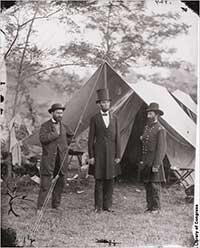 There was at least one other known encounter between the two women. When an aide invited by Robert Lincoln onto the River Queen, the official vessel being used by the President and his wife lingered with Julia Grant in an inner cabin, she noticed Mrs. Lincoln standing alone by herself on the deck, and urged him to fetch a chair for the First Lady. When he approached her politely with the chair, she sharply dismissed him, and then called Mrs. Grant to her side. This encounter was apparently friendly enough, but the First Lady asked Mrs. Grant to have the aide removed from the River Queen. Further, Mrs. Lincoln insisted that her boat must always be closest to the shore and would not cross over the Grant vessel, The Martin, to walk to land. There was at least one other known encounter between the two women. When an aide invited by Robert Lincoln onto the River Queen, the official vessel being used by the President and his wife lingered with Julia Grant in an inner cabin, she noticed Mrs. Lincoln standing alone by herself on the deck, and urged him to fetch a chair for the First Lady. When he approached her politely with the chair, she sharply dismissed him, and then called Mrs. Grant to her side. This encounter was apparently friendly enough, but the First Lady asked Mrs. Grant to have the aide removed from the River Queen. Further, Mrs. Lincoln insisted that her boat must always be closest to the shore and would not cross over the Grant vessel, The Martin, to walk to land.
It has been speculated that the “feud” was less about personal animosity between the two women and rooted more in Mary Lincoln’s initial judgment of Grant as a “butcher,” and Julia Grant’s resentment of that sentiment. There is also some indication that she held an ultimately sympathetic if removed perspective on Mrs. Lincoln and the emotional instability, which the Civil War had created for her.
End of the Civil War:
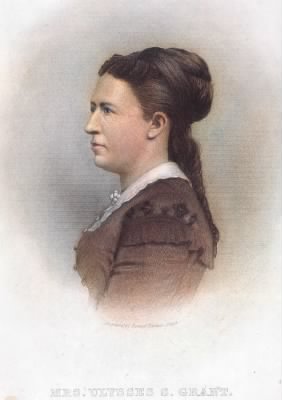 Towards the end of the war, Julia Grant’s national profile had become prominent enough that she was even briefly considered for a type of prelude role to the negotiation of a peace treaty. Union general Edward Ord raised the idea of an exchange of two social calls, one behind Confederate lines, the other behind Union lines between Julia Grant and her old friend Louise Longstreet, who also happened to be the wife of a Confederate general. While these two visits were being made, it was suggested, Grant and Confederate general Robert E. Lee would be encouraged to simultaneously negotiate the peace treaty in complete trust, helping ensure that “terms honorable to both sides could be found.” The plan fell through and robbed Mrs. Grant, she felt, from a role in helping end the war. Towards the end of the war, Julia Grant’s national profile had become prominent enough that she was even briefly considered for a type of prelude role to the negotiation of a peace treaty. Union general Edward Ord raised the idea of an exchange of two social calls, one behind Confederate lines, the other behind Union lines between Julia Grant and her old friend Louise Longstreet, who also happened to be the wife of a Confederate general. While these two visits were being made, it was suggested, Grant and Confederate general Robert E. Lee would be encouraged to simultaneously negotiate the peace treaty in complete trust, helping ensure that “terms honorable to both sides could be found.” The plan fell through and robbed Mrs. Grant, she felt, from a role in helping end the war.
Julia Grant’s longest unbroken period of living with her husband at a military headquarters was at City Point, Virginia from June of 1864 to April of 1865 during the Petersburg siege. Having learned that General Robert E. Lee had surrendered to her husband while she was aboard a Union vessel in the James River, Virginia, Julia Grant remained awake as long as she could in anticipation of his return, overseeing the preparation of a victory dinner. Finally falling asleep, he returned to awake her, confirming the news of the war’s end and they celebrated by sharing the dinner meal as breakfast.
The Lincoln Assassination
 Given her unpleasant history with Mrs. Lincoln, Julia Grant was loathe to be with her again, especially at large events where the public would observe their interactions. Another insult came when the Lincolns invited General Grant to a grand White House celebration of the war’s end on April 13, 1865, but not Mrs. Grant. He refused to attend. The following day, Mrs. Lincoln did invite Mrs. Grant with her husband to join her and the President for a Ford’s Theater performance of Our American Cousins. Given her unpleasant history with Mrs. Lincoln, Julia Grant was loathe to be with her again, especially at large events where the public would observe their interactions. Another insult came when the Lincolns invited General Grant to a grand White House celebration of the war’s end on April 13, 1865, but not Mrs. Grant. He refused to attend. The following day, Mrs. Lincoln did invite Mrs. Grant with her husband to join her and the President for a Ford’s Theater performance of Our American Cousins.
Julia Grant gave her husband the right to accept but otherwise told him, “I will not sit without you in the box with Mrs. Lincoln." The couple used the honest excuse of wanting to be reunited with their children, then staying in their Burlington, New Jersey home.
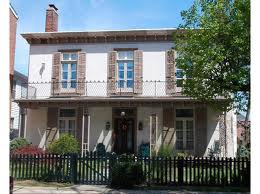 However, several other factors seem likely to have contributed to their refusal to join the Lincolns at the theater. Mrs. Grant recounted that an ominous-looking man on horseback had apparently been following her open carriage and stared in on her earlier that day, leaving her frightened. According to her sister, she had also had one of her premonitory dream about danger that night. However, several other factors seem likely to have contributed to their refusal to join the Lincolns at the theater. Mrs. Grant recounted that an ominous-looking man on horseback had apparently been following her open carriage and stared in on her earlier that day, leaving her frightened. According to her sister, she had also had one of her premonitory dream about danger that night.
While Julia Grant has often been credited with saving the life of her husband, whose name had appeared on the hit list of the assassination conspirators, General Grant essentially suggested that her decision may have unwittingly cost the life of Lincoln, for had they attended his strong cordon of military guards would have been in attendance and prevented Lincoln’s death. The Grants left Washington that evening by railroad, learning at the stop in Philadelphia that the President had been shot.
Post-Civil War Life
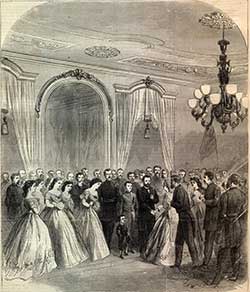 Julia Grant did not join her husband in Washington for Lincoln’s state funeral. She was, however, a prominent figure in the reviewing stand in front of the White House for the two days of massive victory parades in Washington on May 23 and 24, 1865. Julia Grant did not join her husband in Washington for Lincoln’s state funeral. She was, however, a prominent figure in the reviewing stand in front of the White House for the two days of massive victory parades in Washington on May 23 and 24, 1865.
Although her husband was embarrassed at the lavish public outpouring that heralded him as the nation’s greatest hero, in gratitude for the perception that he seemingly ended the Civil War single-handedly, Julia Grant insisted that it was his due, and reveled in seeing him made a hero. She made an effort not only to share in his glorious post-war honors but insisted that their children also be included at every possible reception where their father was being heralded.
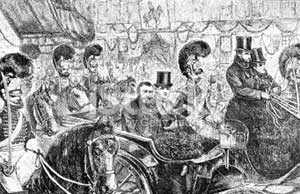 During the summer of 1865, Julia Grant travelled with the General during his rail tour of northern cities, where he was honored with endless parades, receptions and large dinner banquets, both of them plied with gifts from the grateful public. During the summer of 1865, Julia Grant travelled with the General during his rail tour of northern cities, where he was honored with endless parades, receptions and large dinner banquets, both of them plied with gifts from the grateful public.
When the Grant family arrived back in Galena, Illinois, a crowd estimated at 10,000 hailed them. The local residents presented them with a furnished brick home. The family made use of the Galena property as a real home in the postwar years, if only on an intermitted basis.
 Julia Grant welcomed newspaper correspondents into the house to see her family enjoying the rooms of the home, even permitting them to sketch them in private moments like their dinner meal or gathering in the parlor. Julia Grant welcomed newspaper correspondents into the house to see her family enjoying the rooms of the home, even permitting them to sketch them in private moments like their dinner meal or gathering in the parlor.
Grant’s ongoing work with the War Department and his subsequent appointment by President Andrew Johnson as Acting Secretary of War in Washington required his presence in Washington, D.C.
After enduring constant separation from his family during the war, he would no longer tolerate this and thus the family decided not to make Galena their primary residence but to rather relocate to Washington during the initial Reconstruction era.
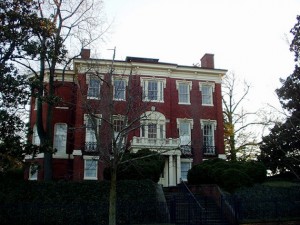 Ultimately, it proved more practical for them to live in Washington, first in the Georgetown section and then, by the end of 1865, in a large rowhouse at 2025 I Street, Northwest. Ultimately, it proved more practical for them to live in Washington, first in the Georgetown section and then, by the end of 1865, in a large rowhouse at 2025 I Street, Northwest.
View of President Andrew Johnson and his family
Unstated but implicit in her views, Julia Grant’s political views during Reconstruction may have influenced her friendly relationship with President Johnson and his family. Given her southern acculturation, Julia Grant was in favor of a tolerant and forgiving attitude towards former Confederates, a policy of President Johnson that led to political challenges of his power. With this, her husband was in accord, writing her on April 25, 1865 that, "people who talked of further retaliation and punishment, except of the political leaders, either do not conceive of the suffering endured already or they are heartless and unfeeling."
Despite the fact that Grant was aware of the fact that President Johnson was using his popularity in an attempt to shield himself from criticism of being too lenient in Reconstruction policy, Julia Grant maintained a friendly relationship with him. On at least one occasion, President Johnson honored her by coming to a reception in their private home, an uncommon custom then for an incumbent Chief Executive.
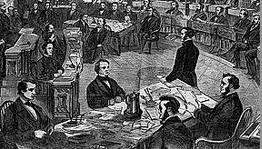 In later years, Julia Grant praised the manners and appearance of the primary public hostess of the Administration, the President’s married daughter Martha Johnson Patterson. None of the Johnson family seemed to flinch when the Marine Band struck up “Hail to the Chief,” the song usually reserved for the President when the Grants entered the White House for the 1866 New Year’s Day Reception. Julia Grant, however, did not join her husband and Martha Patterson on President Johnson’s disastrous public railroad tour in the summer of 1866. In later years, Julia Grant praised the manners and appearance of the primary public hostess of the Administration, the President’s married daughter Martha Johnson Patterson. None of the Johnson family seemed to flinch when the Marine Band struck up “Hail to the Chief,” the song usually reserved for the President when the Grants entered the White House for the 1866 New Year’s Day Reception. Julia Grant, however, did not join her husband and Martha Patterson on President Johnson’s disastrous public railroad tour in the summer of 1866.
By virtue of her husband’s fame, Julia Grant became an overnight sensation in Washington, the general public pushing their way into what she intended to be private receptions in her home. A lavish hostess, invitations to dine in Grant home were a prized commodity among the city’s political elite. Around the city, she was always considered the most prominent figure in the audience at the many lectures, concerts, sermons and theatrical productions she attended. Beyond the circle of military figures of high rank, she came to know key Republican figures in the House and Senate and also befriended many members of the diplomatic corps.
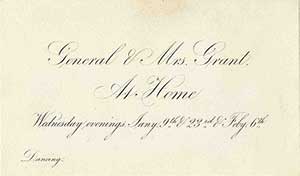 Julia Grant actually provides one of the few first-hand accounts of Eliza Johnson’s presence at formal White House social events, belying the popular misconception that the First Lady was never seen in public. Given the acrimony that developed between President Johnson and General Grant and Julia Grant’s fervent defense of any questionable action or behavior of her husband, her warm recollections of Mrs. Johnson are noteworthy. Archival inventories, however, indicate no direct correspondence between Julia Grant and any of the Johnson family. Julia Grant actually provides one of the few first-hand accounts of Eliza Johnson’s presence at formal White House social events, belying the popular misconception that the First Lady was never seen in public. Given the acrimony that developed between President Johnson and General Grant and Julia Grant’s fervent defense of any questionable action or behavior of her husband, her warm recollections of Mrs. Johnson are noteworthy. Archival inventories, however, indicate no direct correspondence between Julia Grant and any of the Johnson family.
Campaign and Inauguration:
Believing it was her husband’s destiny to become President of the United States, Julia Grant never doubted that, once nominated by the Republican Party as their presidential candidate in 1868, he would win. The candidate did not openly campaign as in later generations, but delegations and individuals came to Grant’s home in Galena to meet him; there Mrs. Grant opened their home, serving refreshments.
On Election night 1868, Julia Grant remained home alone while her husband went to visit friends and play a game of cards, awaiting the returns. When it was clear that her husband had won the presidency, he returned home to s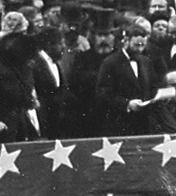 imply tell her, “I am afraid I am elected.” Julia Grant joined him at the door of their Galena home in the morning hours after Election Day, to acknowledge a crowd of supporters who had gathered there to salute him. imply tell her, “I am afraid I am elected.” Julia Grant joined him at the door of their Galena home in the morning hours after Election Day, to acknowledge a crowd of supporters who had gathered there to salute him.
Concerned about the content of his March 4, 1869 Inaugural Address, Julia Grant urged her husband to consult the rather facile Senator Roscoe Conkling of New York, upon finishing his speech, the new President turned to shake the hand of the new First Lady, quipping, "And now, my dear, I hope you're satisfied.” Following the ceremony, Chief Justice Salmon Chase presented Julia Grant with the Bible on which her husband had sworn his oath of office. Standing during the ceremony, she had her elderly father seated near her, despite his continued opposition to Grant’s politics. She would insist upon the now-infirm Colonel Dent live with her and her family in the White House.
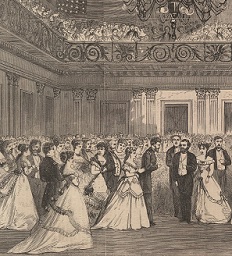 The 1869 Inaugural Ball, held in a wing of the Treasury Department which had been rapidly been completed for the event, proved disastrous with building dust still in the air, debris in the hallways, overcrowding and insufficient staff to handle the coat check. In her gown of white satin and lace, and wearing diamonds and pearls, the new First Lady was a figure of interest equal to her husband, sought out by celebrity guests including Horace Greeley, General Sherman and poet Julia Ward Howe. The 1869 Inaugural Ball, held in a wing of the Treasury Department which had been rapidly been completed for the event, proved disastrous with building dust still in the air, debris in the hallways, overcrowding and insufficient staff to handle the coat check. In her gown of white satin and lace, and wearing diamonds and pearls, the new First Lady was a figure of interest equal to her husband, sought out by celebrity guests including Horace Greeley, General Sherman and poet Julia Ward Howe.
First Lady:
4 March 1869 – 4 March 1877
43 years old
How She Perceived Being First Lady
Julia Grant recalled her eight years as First Lady with the same lavishly romanticized metaphor of a flourishing garden of delights that she used in remembering her childhood. It was not merely the privilege of living in the Executive Mansion and its inherent right to decorate the public rooms and entertain at formal functions, but also the adulation she received personally when she made public appearances, a role she especially relished. Although press and public acknowledgement that women married to or serving as an official hostess to an President held a unique, national status began with Martha Washington at the presidency’s inception, few of the previous women so entirely embraced this as did Julia Grant and none for as long a period. There was also novelty for the public in having a president’s wife solely assume the First Lady role for eight consecutive years; the last time such a situation has occurred was over a half a century earlier when Dolley Madison ended her White House tenure in 1817.
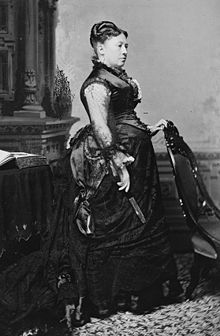 By her spoken and written remarks, Julia Grant indicated her belief that, by virtue of the fact that she was married to the President, she was herself a unique public figure; it may well be that implicit in this sense of entitlement was that she had earned it by the sacrifice and hardship she endured through the entirety of her marriage, for the sole purpose of supporting and defending her husband. However, since Julia Grant always cautiously avoided leaving too detailed a record of any suffering she had endured on behalf of her husband, her sense of self as a rightful public figure was often perceived as a naively arrogant suggestion that she was a queen of a democracy. In truth, she was highly conscious of the fact that any public glorification or condemnation that she personally received was a form of reflective honor or insult to her husband. She believed firmly that, apart from his glorious military career, Ulysses Grant was destined for the presidency, based upon a prophecy made by her mother in the 1850s that this “little man will fill the highest place in the government….He is a great statesmen.” By her spoken and written remarks, Julia Grant indicated her belief that, by virtue of the fact that she was married to the President, she was herself a unique public figure; it may well be that implicit in this sense of entitlement was that she had earned it by the sacrifice and hardship she endured through the entirety of her marriage, for the sole purpose of supporting and defending her husband. However, since Julia Grant always cautiously avoided leaving too detailed a record of any suffering she had endured on behalf of her husband, her sense of self as a rightful public figure was often perceived as a naively arrogant suggestion that she was a queen of a democracy. In truth, she was highly conscious of the fact that any public glorification or condemnation that she personally received was a form of reflective honor or insult to her husband. She believed firmly that, apart from his glorious military career, Ulysses Grant was destined for the presidency, based upon a prophecy made by her mother in the 1850s that this “little man will fill the highest place in the government….He is a great statesmen.”
If she viewed her role as one worthy of public respect, there was also, however, a sense that Julia Grant did not always align it with a sense of obligation of public sacrifice, readily accepting gifts and offered privileges without considering the public reputation of the donor or acknowledging even the potential appearance of conflict of interest. The Attorney General’s wife, for example, believed this was due to the fact that, protected by the chivalrous protection of women, she had never been “taken down,” for her acquisitiveness or held responsible for her choices, finding her "simplicity itself almost flat sometimes…impulsive and governed by her prejudices.” Still, she concluded, “one cannot help liking her because she is so genuine."
One example of what some might have seen as naiveté but others might admirably view as integrity occurred during the Centennial celebration, when some women assembling a cookbook with recipes from prominent women wrote the First Lady requesting an original recipe. Julia Grant fretted about how to respond. Having always had servants to prepare her family’s meals, she had little to no experience with cooking or baking. The only foods she knew how to make were a cake from someone else’s recipe, and jams others cooked as she watched; she finally provided one for chicken gumbo with the honest disclosure that it was from a friend.
Family Life in the White House
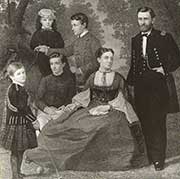 Julia Grant’s willingness to expose the images and stories of her four children continued from the Civil War era into the White House, with the consequence of forever altering the press and public perception of presidential children, helping to permanently establish the concept of a White House “First Family.” A search of newspaper sources affirms that the term “First Family” only first gained currency after the 1962 comedy album about the nuclear and extended family of John F. Kennedy. During the Grant presidency, his children were collectively referenced, along with him and his wife, as “the President’s family” or “the White House family.” Julia Grant’s willingness to expose the images and stories of her four children continued from the Civil War era into the White House, with the consequence of forever altering the press and public perception of presidential children, helping to permanently establish the concept of a White House “First Family.” A search of newspaper sources affirms that the term “First Family” only first gained currency after the 1962 comedy album about the nuclear and extended family of John F. Kennedy. During the Grant presidency, his children were collectively referenced, along with him and his wife, as “the President’s family” or “the White House family.”
With her two eldest sons, Fred and Buck in school at West Point and Harvard, respectively, Julia Grant was reluctant about sending her two youngest children, Nellie and Jesse to boarding school and when, after brief enrollments, each insisted on leaving, she immediately acceded to their wishes. She twice permitted Jesse, as a young teenager, to make the uncertain journey by the new railroad to California. Her other three children made trips to Europe during their father’s presidency.
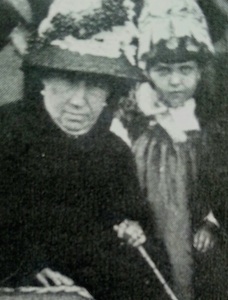 Towards the end of her tenure, Julia Grant also became a grandmother, her son Fred and his wife having a daughter born in the White House in June of 1876 and named for the First Lady. Miss Julia Grant was baptized in the East Room and carried into the Blue Room for the last of the Grant New Year’s Day receptions, and shown to the public. Towards the end of her tenure, Julia Grant also became a grandmother, her son Fred and his wife having a daughter born in the White House in June of 1876 and named for the First Lady. Miss Julia Grant was baptized in the East Room and carried into the Blue Room for the last of the Grant New Year’s Day receptions, and shown to the public.
Entertaining:
In following her own wishes, Julia Grant both broke and set new social precedents. She ignored the traditional customs that forbid Presidents and their spouses from dining in private homes outside the White House or in public restaurants. She encouraged working-class government clerks to feel comfortable in attending her public receptions. Since she often was unable to recognize important figures by sight or recall their name and rank, she began the custom of inviting the wives of Cabinet and Senate members to receive alongside her and introduce for her those more familiar to them. On occasion, her impulse to engage in friendly small-talk posed potential social embarrassment when she encountered important figures who held orthodox views on social issues. Early on, she came to depend on the seasoned social savvy of the Secretary of State’s wife Julia Fish.
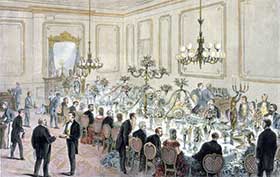 Julia Grant paid a great deal of attention in planning formal dinners, although the President made seating arrangements and chose the wines served to visiting heads of state such as Russia’s Grand Duke Alexis, Hawaii’s King Kalakaua, England’s Prince Arthur and a delegation of Japanese political and military leaders. She hired an Italian chef to create lavish feasts of twenty-five courses for a typically thirty-six guests. Julia Grant paid a great deal of attention in planning formal dinners, although the President made seating arrangements and chose the wines served to visiting heads of state such as Russia’s Grand Duke Alexis, Hawaii’s King Kalakaua, England’s Prince Arthur and a delegation of Japanese political and military leaders. She hired an Italian chef to create lavish feasts of twenty-five courses for a typically thirty-six guests.
Christmas
Mrs. Grant played an unwitting role in the expanding popularity of Christmas as celebrated in Victorian Era America. During her first Christmas as First Lady, she permitted a Washington reporter to publish a full account of how she celebrated the holiday with her nuclear and extended families. She may have copied, consciously or unconsciously, the holiday customs of the British Royal Family, which were widely published in popular women’s magazines of the era to which the First Lady subscribed.
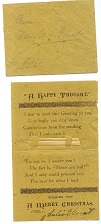 Although already being produced and sold in Great Britain, the first known examples of Christmas cards being mass-marketed in the United States occurred in 1875; Julia Grant sent cards out to personal friends either that first year or in 1876, her last Christmas as First Lady. Although already being produced and sold in Great Britain, the first known examples of Christmas cards being mass-marketed in the United States occurred in 1875; Julia Grant sent cards out to personal friends either that first year or in 1876, her last Christmas as First Lady.
Refurnishing of the White House:
During her husband’s first term, Congress granted the routine appropriation of $25,000 for the new presidential family to use; Mrs. Grant expended this fund primarily in her refurnishing of the second floor of both the family rooms on the west end and the executive offices on the east end. Julia Grant, with an initial $25,000 appropriation, concentrated on refurnishing the family quarters and executive offices at the east end of the second floor. During his second term, however, the shabby public rooms were finally given the attention the space needed, for which Congress provided a fund of $100,000. The First Lady contracted with the New York decorating firm of Herter Brothers, a firm that crafted original furniture as well as lighting fixtures, column supports and wall and floor coverings.
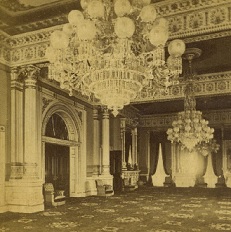 Completed by 1874, in time for the East Room wedding of the First Daughter, the result was a look considered to be the epitome of the Gilded Age. Furniture was in the style of Renaissance Revival, with heavily scrolled and crested pieces, and the East Room chandeliers were ornate and busy, outfitted with multiple glass globes for gaslight. Although she showed no particular interest in the house’s history, she did decide to disperse presidential portraits in the East Room throughout the state floor. Completed by 1874, in time for the East Room wedding of the First Daughter, the result was a look considered to be the epitome of the Gilded Age. Furniture was in the style of Renaissance Revival, with heavily scrolled and crested pieces, and the East Room chandeliers were ornate and busy, outfitted with multiple glass globes for gaslight. Although she showed no particular interest in the house’s history, she did decide to disperse presidential portraits in the East Room throughout the state floor.
Public Appearances outside of Washington:
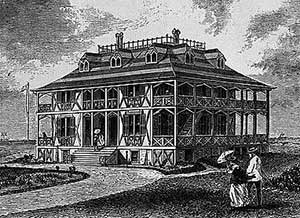 With evidently more frequency than any of her predecessors, Julia Grant made frequent trips that included public appearances outside of Washington both on her own and with the President. Mrs. Grant also accompanied him on most of his regional tours, to New England, the Mid-Atlantic and the northern Midwest. During such public appearances, she also refused to curtail her activities based on assumed societal propriety. In the fall of 1869, for example, she took over the reins of horses pulling the presidential carriage, to test their speed from Pennsylvania to West Virginia. She gleefully joined in the public dancing at a ball in Annapolis, Maryland. In 1871, during a trip to Chicago, the First Lady insisted that they cancel any further itinerary there, based on her premonitory dream of a smoke rising from the wings of a large bird. Shortly after arriving back in Washington, they learned of the fire that spread through and destroyed the city within two days. The Grants were the first presidential family to establish a regular “Summer White House,” retreating to their Long Branch, New Jersey beach home. With evidently more frequency than any of her predecessors, Julia Grant made frequent trips that included public appearances outside of Washington both on her own and with the President. Mrs. Grant also accompanied him on most of his regional tours, to New England, the Mid-Atlantic and the northern Midwest. During such public appearances, she also refused to curtail her activities based on assumed societal propriety. In the fall of 1869, for example, she took over the reins of horses pulling the presidential carriage, to test their speed from Pennsylvania to West Virginia. She gleefully joined in the public dancing at a ball in Annapolis, Maryland. In 1871, during a trip to Chicago, the First Lady insisted that they cancel any further itinerary there, based on her premonitory dream of a smoke rising from the wings of a large bird. Shortly after arriving back in Washington, they learned of the fire that spread through and destroyed the city within two days. The Grants were the first presidential family to establish a regular “Summer White House,” retreating to their Long Branch, New Jersey beach home.
Technology
From the time she first left the St. Louis region, on a riverboat voyage and also observed the lock and canal system, Julia Grant took an avid interest in the technological advances she witnessed. “I was really greatly impressed with the power of man,” she later recalled upon this initial experience, “when I realized what he had accomplished in this great boat.” It was as she toured the exhibitions at the Centennial Exposition in Philadelphia of machinery that promised to serve as labor-saving devices in the Industrial Age that Julia Grant assumed an avid pride in what she considered to be uniquely American ingenuity.
Relationship with the President
Another unprecedented aspect of Julia Grant’s role as First Lady was the widespread public acknowledgement of her importance to the President’s career and the great degree of personal affection between them, a matter previously considered private and inappropriate for public dissemination. Julia Grant spoke openly to family, friends, the public and the press about the fact that she had seen “power and greatness before anyone else,” in her husband and that when they wed she knew she was “marrying a future President.” It was also noteworthy that, despite the firm concepts of gender roles in that era, that the President was equally outspoken in appreciation for “what his wife had done for him."
Even among strangers, the couple was apt to address one another by nicknames, rather than use the formal titles of “Mr. President,” and “Mrs. Grant.” During their early marriage, she would call him “Dudy,” but settled largely on “Ulyss,” or “Lyss.” For a time after the Battle of Vicksburg, she dubbed him “Victor.” To him, she was “Mrs. G.,” or more rarely, “Jules.” Despite the commodious spaces of the many homes they lived in, and without regard to aging, different habits, and health, “Ulys” and “Mrs. G” always shared a bed, even in the White House.
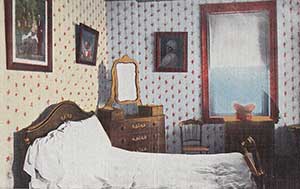 As in earlier years, when they poured through all the published works of William Makepeace Thackeray and Charles Dickens, they spent many long hours alone in one another’s company, the President often reading to his wife due to her increasingly poor eyesight. On other occasions, however, the First Lady often intruded on the presidential study, disrupting his work with her banter and he sharply asked her to leave him. As in earlier years, when they poured through all the published works of William Makepeace Thackeray and Charles Dickens, they spent many long hours alone in one another’s company, the President often reading to his wife due to her increasingly poor eyesight. On other occasions, however, the First Lady often intruded on the presidential study, disrupting his work with her banter and he sharply asked her to leave him.
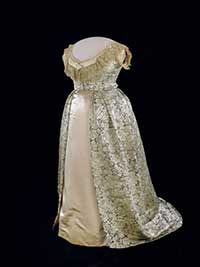 Yet even on the matter of how she would appear publicly, as a symbolic figure, Mrs. Grant dominated. Despite her maturely stout figure, she persisted in her preference for the sleeveless and low-cut gowns of the Gilded Age, The President had repeatedly insisted that she dress modestly, but she urged an older woman to convince him that, “Every woman is bound to make the best appearance she can in observance of the proper customs of her time and station." Yet even on the matter of how she would appear publicly, as a symbolic figure, Mrs. Grant dominated. Despite her maturely stout figure, she persisted in her preference for the sleeveless and low-cut gowns of the Gilded Age, The President had repeatedly insisted that she dress modestly, but she urged an older woman to convince him that, “Every woman is bound to make the best appearance she can in observance of the proper customs of her time and station."
Political Influence:
The degree of influence over the President which the First Lady sought to exercise was never motivated by any personal agenda of her own but rather driven by what she believed was either in his best interests or to help individuals who in some way appealed to her in a personal way. As far as matters about which he sought her advice, she was said to encourage him to do what he knew was the “right” thing, especially when it concerned the fate of individuals and, perhaps at time, induce him to do so.
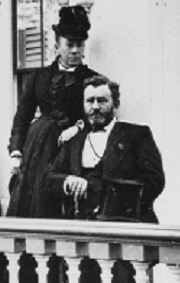 Public speculation about the degree of Julia Grant’s political influence especially surged after the President urged the famous New York department store magnate A.T. Stewart to accept his offer of Treasury Secretary. Considering this a peculiar choice, former Navy Secretary Gideon Welles reported that Mrs. Grant’s love of "Stewart's silks and laces, scandal says, were potent in the appointment." The President claimed that "not even Mrs. Grant," had been a factor in his choice of Stewart, after the Senate refused to confirm him. In contrast, however, when Secretary of State Hamilton Fish offered his resignation, following a failed effort to annex Santa Domingo, President Grant used the First Lady’s social dependency on Mrs. Fish as a primary reason for refusing to accept it. Public speculation about the degree of Julia Grant’s political influence especially surged after the President urged the famous New York department store magnate A.T. Stewart to accept his offer of Treasury Secretary. Considering this a peculiar choice, former Navy Secretary Gideon Welles reported that Mrs. Grant’s love of "Stewart's silks and laces, scandal says, were potent in the appointment." The President claimed that "not even Mrs. Grant," had been a factor in his choice of Stewart, after the Senate refused to confirm him. In contrast, however, when Secretary of State Hamilton Fish offered his resignation, following a failed effort to annex Santa Domingo, President Grant used the First Lady’s social dependency on Mrs. Fish as a primary reason for refusing to accept it.
Julia Grant’s personal relationships with Cabinet spouses figured in two other cases. In 1875, she learned that Kate Williams, wife of Grant’s second Attorney General was living in a dramatically sudden state of luxury. The appearance of Mrs. Williams lavish lifestyle gave credence to the claim that she had taken $30,000 in trade for her husband halting federal litigation on charges of fraud against Pratt & Boyd, a New York mercantile house. In light of Grant’s alacrity in forcing Williams to resign, as well as Julia Grant’s implicit trust in New York Senator Roscoe Conkling who had urged the Williams firing, it seems likely that her influence bolstered this move.
A November 5, 1870 New York Herald article attributed the growing schism on policy matters between the President and Interior Secretary Jacob Cox to the First Lady’s personal conflict with spouse Helen Cox, dubbing it "little disagreements and unpleasantnesses in the female department.” While it certainly provided motivation for Julia Grant to rid the Administration of the Coxes, it was not in any regard for the basis for the Interior Secretary’s resignation.
Generally, however, her influence on patronage was confined to minor political appointments, such as one for George Barnard, the husband of her longtime friend and former classmate Eliza Margaret Perry Shurlds, who the President made Bank Examiner of Missouri. Whether she actually ever insisted on his making specific appointments seems unlikely. On one occasion, a White House aide retained a handwritten note she had scribbled to the President and handed to an officer-seeker, reading, "Dear Ulyss Do please make this appointment. Julia." More certain is that she provided access to him of individuals she considered important and accepted whatever his final decision might be.
Like many First Ladies, Julia Grant’s influence over the President was difficult to always cast in terms of specific policy or appointments. His longtime former aide Adam Badeau perhaps best characterized it: “I was greatly impressed with the influence of his wife, and the impression deepened until the last. Nobody can understand his character or career who fails to appreciate this; no one who did not know him intimately can ever say how much Mrs. Grant helped him; how she comforted him, and enabled him to perform his task, which, without that help and solace, I sometimes thought might never have been performed . . . She soothed him when cares oppressed him, she supported him when even he was downcast (though he told so few); she served him and nerved him at times when he needed all she did for him.”
Nepotism:
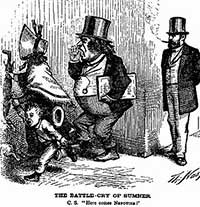 While there is no evidence that Julia Grant specifically insisted on the federal appointment of her own relatives, certainly the rampant, overt nepotism shown to the Dent family would suggest this. By the end of Grant’s first term, two of the First Lady’s brothers and two of her brothers-in-law were holding federal offices. Alexander Sharp and James Casey, the husbands of the First Lady’s two sisters Nellie and Emma had been made, respectively, the marshal of the District of Columbia and the Port of New Orleans collector. Her brother John was given a license to operator of trade with Native Indians in New Mexico Territory and her brother George was named appraiser of Customs at San Francisco. Although she and the President remained personally affectionate with her brother Louis Dent, they completely disavowed his Democratic candidacy as the Governor of Mississippi as an avowed white supremacist, which failed. While there is no evidence that Julia Grant specifically insisted on the federal appointment of her own relatives, certainly the rampant, overt nepotism shown to the Dent family would suggest this. By the end of Grant’s first term, two of the First Lady’s brothers and two of her brothers-in-law were holding federal offices. Alexander Sharp and James Casey, the husbands of the First Lady’s two sisters Nellie and Emma had been made, respectively, the marshal of the District of Columbia and the Port of New Orleans collector. Her brother John was given a license to operator of trade with Native Indians in New Mexico Territory and her brother George was named appraiser of Customs at San Francisco. Although she and the President remained personally affectionate with her brother Louis Dent, they completely disavowed his Democratic candidacy as the Governor of Mississippi as an avowed white supremacist, which failed.
The nepotism shown the First Lady’s family became a political controversy. The “Dent Family Ring,” as the National Quarterly Review dubbed it, was used as an attack point by Grant’s 1872 presidential Democratic rival Horace Greeley. In the Senate, Charles Sumner of Massachusetts made a partisan attack on the Dents, declaring it was scandalous that there was, "A dozen members of the family billeted upon the country!"
Administration Scandals:
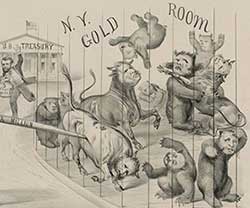 There were a series of political scandals that plagued the eight-year Grant Administration, one of which directly implicated the First Lady. There were a series of political scandals that plagued the eight-year Grant Administration, one of which directly implicated the First Lady.
At the center of the so-called “Gold Crisis” which broke in the fall of 1869 were Jay Gould and Jim Fisk, Gilded Age financiers who had quickly befriended the First Lady; they made their yacht available to the Grants, made them their theater guests and plied her with lavish gifts which she failed to see as a potential political conflict. Seeking to garner massive profits by purchasing as much gold as possible and driving up its market price, they invited lobbyist Abel Corbin, married to Grant’s sister, to join them as a partner in the scheme. Corbin’s role was to write the President and urgently warn him not to take action if the gold market appeared unstable. Wisely, Grant did not respond to Corbin, but rather asked the First Lady to write his sister, "My husband is annoyed by your husband's speculations. You must close them as quick as you can." Corbin contacted his conspirators to immediately abandon the plan but not before Grant released Treasury gold reserves and prevented them from profiting. The scandal nevertheless plummeted the gold market and Julia Grant was directly implicated as having profited $25,000. It led to the first congressional investigation into the activities of a First Lady, but she was cleared of any wrongdoing.
Her closest working relationship with a member of the President’s staff was with Private Secretary Orville Babcock. Acquaintances since he had served as Grant’s Civil War and post-Civil War aide, Julia Grant grew to trust him. As First Lady, she relied on Babcock for a number of tasks. As otherwise anonymous 1874 letters from “a Northerner,” and a “lover of justice” in Chicago’s Newberry Library’s Babcock Papers suggest, she turned over public correspondence directed at her to Babcock for handling. He also retained some of her financial records. Babcock would later become implicated as profiting from a scheme to siphon federal tax funds from whiskey sales. Although the President loyally testified to Babcock’s character and the aide was acquitted of charges, Julia Grant considered his sketchy behavior an overt betrayal to her and her husband and successfully urged for his transfer from the executive staff.
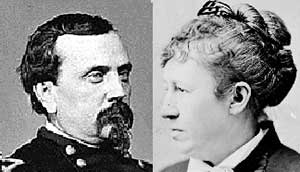 The third major scandal of the Grant Administration involved the charge of graft being condoned by his War Secretary Belknap in his awarding of tradership permits on Native Indian reservations. Before the Whiskey Ring investigation had died down the Belknap scandal developed and again the President faced a crisis. His Secretary of War was accused of graft in connection with Indian-post traderships. The First Lady’s brother was also implicated. The Memphis Public Ledger on March 11, 1876, reported that Mrs. Belknap, being investigated for claims that her husband awarded government favors to those who gave her personal gifts lashed out at Mrs. Grant as having done far worse than this, and that “her care is of little importance compared with the situation of others.” The article was followed by a story of how the First Lady had accepted the gift of a gold watch valued at several thousand dollars. The third major scandal of the Grant Administration involved the charge of graft being condoned by his War Secretary Belknap in his awarding of tradership permits on Native Indian reservations. Before the Whiskey Ring investigation had died down the Belknap scandal developed and again the President faced a crisis. His Secretary of War was accused of graft in connection with Indian-post traderships. The First Lady’s brother was also implicated. The Memphis Public Ledger on March 11, 1876, reported that Mrs. Belknap, being investigated for claims that her husband awarded government favors to those who gave her personal gifts lashed out at Mrs. Grant as having done far worse than this, and that “her care is of little importance compared with the situation of others.” The article was followed by a story of how the First Lady had accepted the gift of a gold watch valued at several thousand dollars.
In general, the First Lady sought to rid the Administration of those she believed were harming the President, despite his refusal to often do so, on the premise of loyalty. Observed Adam Badeau, “there were occasions when it would have been better for him had she succeeded."
Social Justice Issues, Charitable Efforts:
Generally charitable person, in her earlier years Julia Grant was noted for being quick to provide support to anyone she was told about in need, be it food supplies or financial aid. As First Lady, she continued this custom by small acts such as sending along barrels of fruit and candy during the holiday season to hospital and asylum patients. She did not, however, adopt a particular demographic which was neglected or in need.
As a former owner of slaves, Julia Grant had long lived with what suggests her belief that African-Americans occupied an inferior social status to those of European ancestry. Despite this, she later recorded that at her implicit order, there was to be no barring of any individual based on their race from attending her open-house receptions. Noting that no African-Americans seemed to wish to attend, only later did she discover that White House doormen had prevented them entrance.
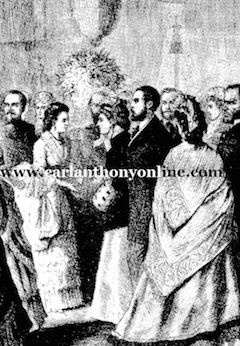 Among the African-American domestic staff workers of the White House, Mrs. Grant was fondly recalled for her interest in their financial stability and advice of purchasing a home, both for their residency and as a solid financial investment. It was towards specific individuals where Mrs. Grant’s public support most often emerged, rather than through any organized association intended to aid a cause. Not until after she’d left the White House, for example, was one particularly generous act she took publicly reported. When it was determined that a young African-American White House doorkeeper George S. Joice, a Union Army veteran, was terminally ill and that he family was barely surviving in poverty, the First Lady sent him a monthly check for the remaining fourteen months of his life. Among the African-American domestic staff workers of the White House, Mrs. Grant was fondly recalled for her interest in their financial stability and advice of purchasing a home, both for their residency and as a solid financial investment. It was towards specific individuals where Mrs. Grant’s public support most often emerged, rather than through any organized association intended to aid a cause. Not until after she’d left the White House, for example, was one particularly generous act she took publicly reported. When it was determined that a young African-American White House doorkeeper George S. Joice, a Union Army veteran, was terminally ill and that he family was barely surviving in poverty, the First Lady sent him a monthly check for the remaining fourteen months of his life.
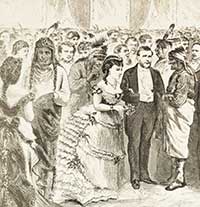 Following a custom of her predecessors, Julia Grant appeared with the President at White House ceremonies welcoming Native American Indian leaders and delegations, but voiced no opinion on disputed land claims or treaties. She objected to U.S. citizenship of those Mormon men who maintained polygamous marriages, a controversial tenet of their faith. Following a custom of her predecessors, Julia Grant appeared with the President at White House ceremonies welcoming Native American Indian leaders and delegations, but voiced no opinion on disputed land claims or treaties. She objected to U.S. citizenship of those Mormon men who maintained polygamous marriages, a controversial tenet of their faith.
The Press
Although Julia Tyler had engaged F.W. Thomas of the New York Herald to write flattering accounts of her social events for her brief eight months as First Lady, it was Julia Grant who first gave regular access to both her and White House events with full coverage in the public press. While generally finding newspaper accounts describing activities she witnessed or was involved in to be inaccurate, Mrs. Grant was entirely comfortable in the company of reporters. During her daughter’s grand White House wedding, Mrs. Grant even gave one newspaper correspondent exclusive access to cover the event in detail for the public. By the proliferation of newspaper stories about her, author Henry Adams felt she was familiar enough to the general population for him to use as the model of his thinly-veiled fictional First Lady character in his novel Democracy.
Most notable is another precedent set by Julia Grant by issuing what is likely the first press release to come directly from, and quote a First Lady, although it pertained to a trivial matter. Asked to name which American woman dressed so well that she could lead fashion trends away from the dominant European influence of France’s Empress Eugenie, Julia Grant issued the statement for publication that, "In matters pertaining to good sense and fine tact, I rely upon Mrs. Fish," said Julia.
First Lady title:
As late as December 1873, the Washington Evening Star still referred to her with the old-style title of “Mrs. President Grant,” but by January 20, 1875 a Honolulu publication described her as “first lady in the land.” At the time, American newspapers such as The Saline [Kansas] County Journal, such as in its September 24, 1874 edition, had begun to also make reference to Queen Victoria as the “first lady in the land” of England. There was also a Washington correspondent who covered social events with the nom de plume of “Mrs. Duffy,” who declared that the wife of the Chief Justice must be called the “first lady.”
Public Criticism:
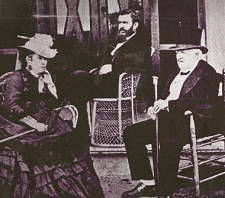 It was on essentially private family decisions where Mrs. Grant encountered press criticism. When she appeared at the 1874 New Year’s Eve Reception shortly after her father’s death in the White House, the incident was compared to the famous incident of Mary Lincoln hosting a White House reception as her son Willie was dying upstairs, reporter Dan Piatt declaring that “to say this was positively shocking is to use very mild language." It was on essentially private family decisions where Mrs. Grant encountered press criticism. When she appeared at the 1874 New Year’s Eve Reception shortly after her father’s death in the White House, the incident was compared to the famous incident of Mary Lincoln hosting a White House reception as her son Willie was dying upstairs, reporter Dan Piatt declaring that “to say this was positively shocking is to use very mild language."
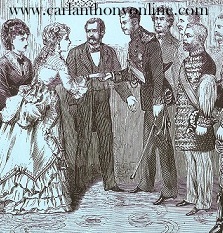 She was especially attacked for being a permissive parent. Most pointed were the facts that she encouraged her teenage daughter’s habit of attending dances into the wee hours and not pursuing a formal education. The popular newspaper columnist Mary Clemmer Ames was especially hard in taking the First Lady to task for launching Nellie Grant “into the wild tide of frivolous pleasure.” The newspaper Capital further criticized her permitting her children to travel overseas, “carted over Europe by our flunky diplomats as specimens of the so-called American court and blood royal.” Despite her misgivings, the First Lady also permitted the unschooled Nellie Grant to marry an English citizen, Algernon Sartoris. The 1874 White House wedding made national headlines, with illustrated newspapers carrying images of the wedding ceremony, decorated East Room and clothing. She was especially attacked for being a permissive parent. Most pointed were the facts that she encouraged her teenage daughter’s habit of attending dances into the wee hours and not pursuing a formal education. The popular newspaper columnist Mary Clemmer Ames was especially hard in taking the First Lady to task for launching Nellie Grant “into the wild tide of frivolous pleasure.” The newspaper Capital further criticized her permitting her children to travel overseas, “carted over Europe by our flunky diplomats as specimens of the so-called American court and blood royal.” Despite her misgivings, the First Lady also permitted the unschooled Nellie Grant to marry an English citizen, Algernon Sartoris. The 1874 White House wedding made national headlines, with illustrated newspapers carrying images of the wedding ceremony, decorated East Room and clothing.
Julia Grant’s physicality and clothing were also frequent topics of her press coverage. When newspaper reports began to praise her successor Lucy Hayes by saying she “would not in the White House set an example of extravagance,” it brought a public defense in the November 20, 1876 issue of the Washington Evening Star which declared, “The facts do not sustain this insinuation, since Mrs. Grant is neither extravagant in her style of dress, nor have she and her husband been disposed to display in their entertainments.” One popular woman’s columnist by the nom de plume of “Olivia” praised Mrs. Grant for publicly displaying her "comely neck and shoulders." A reporter for the Hawaiian Gazette defended her against what it termed, “newspaper telltales [that] have slandered her personal appearance.” One newspaper did circularly suggest her avoirdupois by referencing her “matronly style and figure,” and “well-rounded, luxurious figure…Mrs. Grant’s stature and face both betray the evidences of generous living.” One publication even declared that her appearance in black mourning clothes were “ghastly.”
While Julia Grant was both comfortable around reporters and accommodating of their requests, she also displayed some naivete about the potential risks of this new role for a First Lady. She either ignored or was unaware of the growing political power of the Prohibition Party, famous for serving an intensely intoxicating whiskey punch to White House guests. She seemed unconscious of how easily her behavior could be closely observed and interpreted by the press. Once dashing down the steps of her summer home to hand a young Cabinet member’s daughter a late morning glass of wine, in front of a reporter who was there to interview the President. There is no evidence, however, that she endured press criticism for serving and imbibing of alcoholic beverages; it has been only in retrospect, and in contrast to her successor Lucy Hayes that Julia Grant’s permissiveness about hard liquor was raised as a point of judgment.
The 1876 Election and Departure:
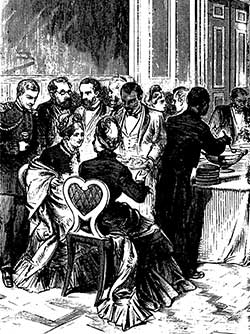 Julia Grant enthusiastically encouraged the idea of her husband seeking an unprecedented term in the 1876 election; she was devastated when the President surreptitiously released a statement to the press declaring that he would not seek a third term and refuse even a draft nomination without first seeking her counsel. He later quipped that had he done so, he might well have not released his declaration. When the final result of the election was thrown into dispute, Mrs. Grant saw it as a potential opportunity to extend her stay in the White House, suggesting to the President that another election might even be held – and that they remain in power until a new tabulation was taken. When, a Senate Commission finally chose Republican candidate Rutherford Hayes as the victor, Mrs. Grant gamely hosted a welcoming dinner for him and his wife, the night before he was publicly sworn into office. Seeking to delay her final departure from the White House, however, Mrs. Grant suddenly ordered the staff to prepare a formal luncheon for the new President and First Lady to be held after the ceremony, despite the fact that her own husband was no longer officially President. It was the first such event of its kind and it allowed Julia Grant to serve as White House hostess for Lucy Hayes, the woman who technically had just become the First Lady. Julia Grant enthusiastically encouraged the idea of her husband seeking an unprecedented term in the 1876 election; she was devastated when the President surreptitiously released a statement to the press declaring that he would not seek a third term and refuse even a draft nomination without first seeking her counsel. He later quipped that had he done so, he might well have not released his declaration. When the final result of the election was thrown into dispute, Mrs. Grant saw it as a potential opportunity to extend her stay in the White House, suggesting to the President that another election might even be held – and that they remain in power until a new tabulation was taken. When, a Senate Commission finally chose Republican candidate Rutherford Hayes as the victor, Mrs. Grant gamely hosted a welcoming dinner for him and his wife, the night before he was publicly sworn into office. Seeking to delay her final departure from the White House, however, Mrs. Grant suddenly ordered the staff to prepare a formal luncheon for the new President and First Lady to be held after the ceremony, despite the fact that her own husband was no longer officially President. It was the first such event of its kind and it allowed Julia Grant to serve as White House hostess for Lucy Hayes, the woman who technically had just become the First Lady.
Life after the White House:
World Tour
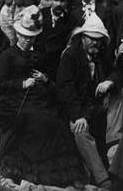 Julia Grant’s displeasure at having to leave the White House dissipated within eight weeks. On May 17, 1877, the former First Lady and former President began an unprecedented and legendary world tour. For the next two and a half years, they explored and were feted through England, Scotland, Belgium, France, Switzerland, Italy, Egypt, Turkey, Greece, Germany, Denmark, Sweden, Norway, Russia, Poland, Austria, Spain, Portugal, India, Singapore, Thailand, China, and Japan. They did not return to the U.S. until September 1879. Julia Grant’s displeasure at having to leave the White House dissipated within eight weeks. On May 17, 1877, the former First Lady and former President began an unprecedented and legendary world tour. For the next two and a half years, they explored and were feted through England, Scotland, Belgium, France, Switzerland, Italy, Egypt, Turkey, Greece, Germany, Denmark, Sweden, Norway, Russia, Poland, Austria, Spain, Portugal, India, Singapore, Thailand, China, and Japan. They did not return to the U.S. until September 1879.
In Cairo they lived in a palace. In India, she rode on an elephant. Her appearance at the 1878 Paris Exposition caused a sensation. In China, four palace servants carried her about on a sedan chair and she gamely tried eating with chopsticks as a sign of respect to her hosts. Mrs. Grant proved herself a worldly equal to titled royals and state leaders, discussing war strategies with Otto von Bismarck in Germany, import trade laws with ‘s Belgium’s King Leopold, and Shakespearean works with the King of Portugal. It was only after she had left Pau, France that she learned that the neglected and widowed Mary Lincoln was living in obscurity, claiming that had she known she would have paid her a call, despite her previous misgivings.
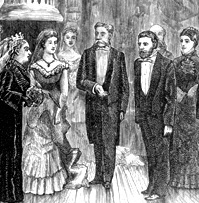 Along the tour, Julia Grant made more of an indelible impression than did her laconic husband. When England’s Victoria spoke of her official duties wearily, the former American First Lady responded without regard for the fact that the Queen reigned in her own right by inheritance. "Yes, I can imagine them,” said Mrs. Grant. “I, too, have been the wife of a great ruler." Along the tour, Julia Grant made more of an indelible impression than did her laconic husband. When England’s Victoria spoke of her official duties wearily, the former American First Lady responded without regard for the fact that the Queen reigned in her own right by inheritance. "Yes, I can imagine them,” said Mrs. Grant. “I, too, have been the wife of a great ruler."
In Italy, she ignored the challenge of her stout figure to balance herself on donkeys and journey up mountains and hilltops. In an affection private letter to their son Fred, the former President noted that: “Your Ma balances on a donkey very well when she has an 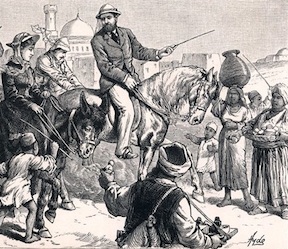 Arab on each side to hold her and me to lead the donkey. Yesterday, however, she got a little out of balance twice, but claims that the saddle turned. Of course it did. How could it have done otherwise with 185 pounds in a stirrup on one side and the donkey only weighing 125 pounds. But she rides a donkey very well on the whole. “ Arab on each side to hold her and me to lead the donkey. Yesterday, however, she got a little out of balance twice, but claims that the saddle turned. Of course it did. How could it have done otherwise with 185 pounds in a stirrup on one side and the donkey only weighing 125 pounds. But she rides a donkey very well on the whole. “
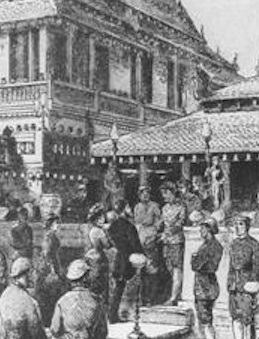 Throughout the two years of world travel, Julia Grant developed a close friendship with a leading journalist of the era, John Russell Young who had been assigned to cover the unique journey for the New York Tribune. In time, this native of Ireland grew especially fond of the former First Lady, giving in to her imploring to join her on shopping sprees and see historic sights that others in the party passed up. In turn, he gave the American public a running chronicle of her, offering the nation its first genuine revelations about a woman who had been the nation’s First Lady was truly like as a person. It contributed greatly to the public’s sense of attachment to and affection for Mrs. Grant during the rest of her life. It also relaxed the strictures of Victorian propriety for her, providing her a trusting comfort level, almost camaraderie with newspaper and magazine journalists. Throughout the two years of world travel, Julia Grant developed a close friendship with a leading journalist of the era, John Russell Young who had been assigned to cover the unique journey for the New York Tribune. In time, this native of Ireland grew especially fond of the former First Lady, giving in to her imploring to join her on shopping sprees and see historic sights that others in the party passed up. In turn, he gave the American public a running chronicle of her, offering the nation its first genuine revelations about a woman who had been the nation’s First Lady was truly like as a person. It contributed greatly to the public’s sense of attachment to and affection for Mrs. Grant during the rest of her life. It also relaxed the strictures of Victorian propriety for her, providing her a trusting comfort level, almost camaraderie with newspaper and magazine journalists.
Western Tour:
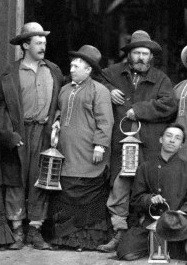 When the Grants landed in San Francisco on September 20, 1879, they were greeted with the city’s largest gatherings of crowds in the street to that time. They meandered their way back towards the East Coast, making stops in Oregon, the Sierra Mountain range, and Yosemite Park. In Virginia City, Nevada, and Leadville, Colorado, the stout former First Lady shocked others in the party by gamely donning miner’s clothing and carrying a gas-lamp to descend into a deep mine. She did so, she stated, when she learned that the former President had made a secret bet among other men in the party that she would never do so. When he asked if she were really going to go through with it, she recalled, “'Yes,' I said, with a look of reproach and triumph. So the General lost his wager when he bet against me." When the Grants landed in San Francisco on September 20, 1879, they were greeted with the city’s largest gatherings of crowds in the street to that time. They meandered their way back towards the East Coast, making stops in Oregon, the Sierra Mountain range, and Yosemite Park. In Virginia City, Nevada, and Leadville, Colorado, the stout former First Lady shocked others in the party by gamely donning miner’s clothing and carrying a gas-lamp to descend into a deep mine. She did so, she stated, when she learned that the former President had made a secret bet among other men in the party that she would never do so. When he asked if she were really going to go through with it, she recalled, “'Yes,' I said, with a look of reproach and triumph. So the General lost his wager when he bet against me."
They finally reached their Galena, Illinois home in November of 1879.
Partisan Politics:
In the summer of 1880, as she returned west to tour Colorado and New Mexico Territory with her husband and attend ceremonies marking the completion of the transcontinental railroad, Julia Grant held optimistic hope that a movement among the “Stalwart” wing of the Republican Party then underway to draft the former President for an unprecedented third term would return her to the White House. When James Garfield was instead nominated, the former First Lady was privately devastated, despite the fact that her husband did not seriously wish to become President again. At year’s end, by which time Garfield was elected, they made their first return to Washington in four years, city church bells chiming “Home Again” in welcome and the President and Mrs. Hayes honoring them with a dinner.
With “Stalwart Republican” Chester Arthur’s ascension to the presidency upon Garfield’s assassination, Ulysses and Julia Grant again took center stage on the national scene. President Arthur’s first state dinner was in honor of the Grants and he sent the former President to negotiate a trade treaty with Mexico. Julia Grant joined him on excursions to both Mexico and Cuba.
New York:
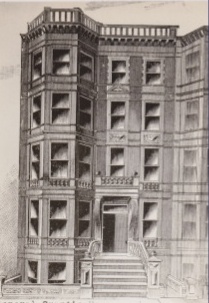 Upon their return from their world tour, the Grants were actually cash-poor, despite their property holdings in Missouri, Illinois, Washington, New Jersey, and Pennsylvania. Congress did not yet provide a pension for former Presidents so a group of twenty wealthy friends, including J.P. Morgan, raised $100,000 and purchased a four-story New York City brownstone home for the Grants at 3 East Sixty-sixth Street. By 1880, after permitting his son Buck to use his name in partnership with Wall Street investors Ferdinand Ward and James D. Fish, the former President soon had a flow of great wealth. " As a family we are much better off than ever we were before,” he wrote proudly to his daughter in the middle of that year. Julia Grant, however, voiced misgivings about the venture with Ward. Upon their return from their world tour, the Grants were actually cash-poor, despite their property holdings in Missouri, Illinois, Washington, New Jersey, and Pennsylvania. Congress did not yet provide a pension for former Presidents so a group of twenty wealthy friends, including J.P. Morgan, raised $100,000 and purchased a four-story New York City brownstone home for the Grants at 3 East Sixty-sixth Street. By 1880, after permitting his son Buck to use his name in partnership with Wall Street investors Ferdinand Ward and James D. Fish, the former President soon had a flow of great wealth. " As a family we are much better off than ever we were before,” he wrote proudly to his daughter in the middle of that year. Julia Grant, however, voiced misgivings about the venture with Ward.
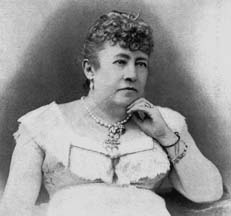 Mrs. Grant especially loved being at the center of social life in Gilded Age New York, often appearing at theater premiers and a subscriber to the Metropolitan Opera. Julia Grant ran the home as if it were a small White House, holding receptions, welcoming heads of state visiting New York and celebrities like Oscar Wilde. In the public rooms she displayed relics of her husband’s military career and the Civil War, as well as the lavish gifts state gifts presented to the Grants during their world tour. Mrs. Grant especially loved being at the center of social life in Gilded Age New York, often appearing at theater premiers and a subscriber to the Metropolitan Opera. Julia Grant ran the home as if it were a small White House, holding receptions, welcoming heads of state visiting New York and celebrities like Oscar Wilde. In the public rooms she displayed relics of her husband’s military career and the Civil War, as well as the lavish gifts state gifts presented to the Grants during their world tour.
Financial Ruin:
In the spring 1884, the former President’s wealth as well as that of those friends and family members he had urged to invest in the firm carrying his name was wiped out, the result of Ferdinand Ward having willfully established it as a ponzi scheme.
Financier Cornelius Vanderbilt made the grand gesture of bailing the Grants out of their $150,000 debt, but at the direction of Julia Grant, the couple decided to turn over all their assets in repayment, from property that was in both of their names to the state gifts they’d received from world leaders during their global tour. Wisely, however, it was Mrs. Grant who alone held the deeds to their New York home and their summer home in Long Branch, New Jersey, and these were not offered. Vanderbilt refused to accept the deeds and after legally accepting the state gifts, he then turned ownership back to Mrs. Grant on the condition that she eventually donate them to the federal government on behalf of the American people. Initially, Grant refused to accept Vanderbilt’s gesture of forgetting the debt. In response to this, Vanderbilt advised that he would take whatever money came from the properties and establish a trust fund for Mrs. Grant.
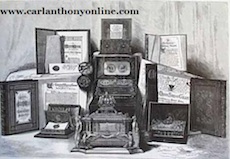 The former President readily accepted this arrangement. The former First Lady, however, did not. It appears that nothing but personal pride led her to write Vanderbilt several hours after her husband had agreed to the arrangement: "Upon reading your letter of this afternoon General Grant and myself felt that it would be ungracious to refuse your princely and generous offer. Hence his note to you. But upon reflection I find that I cannot, I will not, accept your munificence in any form. I beg that you will pardon this apparent vacillation and consider this answer definite and final." The former President readily accepted this arrangement. The former First Lady, however, did not. It appears that nothing but personal pride led her to write Vanderbilt several hours after her husband had agreed to the arrangement: "Upon reading your letter of this afternoon General Grant and myself felt that it would be ungracious to refuse your princely and generous offer. Hence his note to you. But upon reflection I find that I cannot, I will not, accept your munificence in any form. I beg that you will pardon this apparent vacillation and consider this answer definite and final."
In a dramatic gesture, Julia Grant announced that she would make an immediate donation of her husband’s Civil War memorabilia and the state gifts to the Smithsonian Institution. No former First Lady had ever taken such a public act and it earned her another precedent, that of being singled out with official recognition not merely through her marital status but as an individual in her own right. In February of 1885, in his State of the Union message (not then made as a speech) President Chester Arthur praised the "high sense of public regard which animates Mrs. Grant." She also willed gold vases and a one-thousand-year-old lacquered cabinet given her in Japan to New York’s Metropolitan Museum.
Role during Grant’s Final Illness and Death:
The former President began to earn large sums by authoring a number of lengthy magazine articles and contracting to write and publish his memoirs. Before he could entirely rebuild their financial security, however, he was diagnosed with throat cancer.
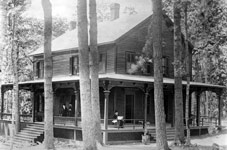 At the urging of Julia Grant, he accepted the offer of banker Joseph Drexel to use his Adirondack Mountain cottage in the town of Mount McGregor, New York, just outside of Saratoga Springs. With their married children and grandchildren as well as servants and aides, the Grant entourage relocated there in June of 1885. At the urging of Julia Grant, he accepted the offer of banker Joseph Drexel to use his Adirondack Mountain cottage in the town of Mount McGregor, New York, just outside of Saratoga Springs. With their married children and grandchildren as well as servants and aides, the Grant entourage relocated there in June of 1885.
During the remaining weeks of his life, Julia Grant assumed management of her husband and the activities around him. Although there were two servants to aid Grant as his physical disability increased, she was vigilantly at his side, the moment he awoke each morning or from a nap. The enormous national and then international interest in Grant over the months of his demise soon led to one of the world’s first simultaneously-experienced “media events,” carried out through the daily news bulletins provided by reporters who maintained a vigil from a nearby hotel.
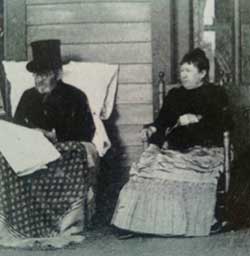 Sensitive to how closely the world was following the “death watch,” the former President never appeared on his porch chair without Mrs. Grant seated close to him, attentive to preventing any fall or accident. When the former President composed a statement of gratitude for the “sympathy” he was receiving in letters from the public, for example. Julia Grant instructed that the word “prayerful” must be inserted before its release, to acknowledge those church and other religious organizations calling on congregants to pray for him. Sensitive to how closely the world was following the “death watch,” the former President never appeared on his porch chair without Mrs. Grant seated close to him, attentive to preventing any fall or accident. When the former President composed a statement of gratitude for the “sympathy” he was receiving in letters from the public, for example. Julia Grant instructed that the word “prayerful” must be inserted before its release, to acknowledge those church and other religious organizations calling on congregants to pray for him.
"Her behavior was a mystery,” aide Adam Badeau later admitted, Her calmness and self-control almost seemed coldness, only we knew that this was impossible." While she did maintain her characteristic optimism, Julia Grant was processing her imminent loss without denial or self-pity. In private, she prayed fervently. She wrote to friends suggesting she knew his case was terminal, yet kept to the tenet of her husband’s advice that, “As long as there is no progress [of the cancer] there is hope." She told jokes to keep him entertained, and often jested with Mark Twain, during his visits, laughing heartily despite the serious reality she was facing.
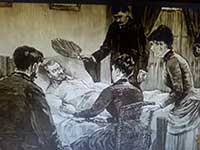 On July 23, 1885, just four days after finishing his memoirs, former President Grant died. Julia Grant was too bereft to attend what proved to be the largest public funeral ever held in New York City. His August 8 funeral services for the first time gathered three presidents (Hayes, Arthur and incumbent Grover Cleveland). On July 23, 1885, just four days after finishing his memoirs, former President Grant died. Julia Grant was too bereft to attend what proved to be the largest public funeral ever held in New York City. His August 8 funeral services for the first time gathered three presidents (Hayes, Arthur and incumbent Grover Cleveland).
Presidential Widow
In February of 1886, a year after her husband’s death, pre-sales and sales of Grant’s Memoirs led to Julia Grant receiving the largest single royalty check in history, for a total amount of $200,000, delivered to her by Mark Twain. She received a second one for $150,000 and over time another $50,000 was earned for her.
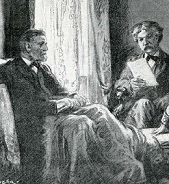 Mrs. Grant was also awarded an annual $5,000 presidential widow’s pension by Congress, which also granted her the franking privilege. She made many of her own astute financial decisions, investing for example in Homestead Steel Works and joking to its owner Andrew Carnegie that she’d become “partner in your great industry.” As a presidential widow, Julia Grant remained a prominent public figure, both by her physical presence at national ceremonial events and those hosted at the White House and in the nation’s newspapers and magazines. Mrs. Grant was also awarded an annual $5,000 presidential widow’s pension by Congress, which also granted her the franking privilege. She made many of her own astute financial decisions, investing for example in Homestead Steel Works and joking to its owner Andrew Carnegie that she’d become “partner in your great industry.” As a presidential widow, Julia Grant remained a prominent public figure, both by her physical presence at national ceremonial events and those hosted at the White House and in the nation’s newspapers and magazines.
Public Appearances Honoring Grant
For the rest of her life, Julia Grant referred to her late husband as “the General,” and never “the President. “ In the years immediately following Grant’s death, before final plans were drawn to build a grand memorial for his burial spot in New York, near to where he was laid to rest in a temporary vault, Julia Grant refused to consider other offers which precluded her from later being placed with him. She also vetoed a U.S. Senate plan to have him buried in Arlington National Cemetery, as well as a relatively modest one to have him buried in Galena, Illinois. Once New York’s Riverside Drive was finally chosen as the site for “Grant’s Tomb” she also insisted the architectural plan to have herself eventually placed within the same sarcophagus as her husband be modified because his “identity must remain distinct.”
Julia Grant was the central figure at the groundbreaking ceremony for “Grant’s Tomb” on April 27, 1891. Six months later, she went to Chicago to preside over the unveiling of a statue built for him in Lincoln Park. Following the ceremony, she reviewed a large parade of Union Army veterans, had her carriage join the line and hosted a reception for several thousand of them. In April 1892, she returned to preside over the laying of the Grant’s Tomb cornerstone, alongside President Benjamin Harrison. That night, as she had in some previous years, she watched from a balcony as men who had known, served under or worked with her late husband gathered for his annual birthday tribute.
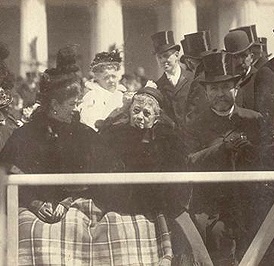 During the five-hour April 27, 1897 dedication festivities of Grant’s Tomb, Julia Grant sat with her daughter. In his dedicatory speech, President McKinley made reference to her, remarking that, “brilliant as was his public character, we love him all the more for his home life and homely virtues.” Two years later, she again joined by President McKinley for the dedication of a Grant statue in Philadelphia. Although vanity prevented her from wearing spectacles, which would have improved her poor eyesight, she was noted for being among the first famous women to appear in public wearing sunglasses. During the five-hour April 27, 1897 dedication festivities of Grant’s Tomb, Julia Grant sat with her daughter. In his dedicatory speech, President McKinley made reference to her, remarking that, “brilliant as was his public character, we love him all the more for his home life and homely virtues.” Two years later, she again joined by President McKinley for the dedication of a Grant statue in Philadelphia. Although vanity prevented her from wearing spectacles, which would have improved her poor eyesight, she was noted for being among the first famous women to appear in public wearing sunglasses.
As his widow, she also assumed the role of protecting and defending his memory. When Grant’s former military aide Adam Badeau, who’d later helped organize Grant’s papers and work on his memoirs, sued his estate for a larger share than previously agreed upon, Julia Grant refused to any out-of-court settlement. She successfully insisted not just that Badeau was owed no further profit but upon his recanting previous suggestions that anyone but Grant had written his memoirs. She also repeatedly declared that her husband was a well-read man.
A Literary Digest reporter granted an 1896 interview by Mrs. Grant recorded that, “No married couple ever lived closer to each other than did the General and Mrs. Grant. She was, perhaps, his only real confidant. The two were one in almost everything, and their life was a most beautiful one.” Julia Grant claimed that any recognition she received was not due to her own accomplishments but a reflection of respect for her late husband, that “the light of his glorious fame still reaches out to me, falls upon me, and warms me."
First First Lady Captured on Film:
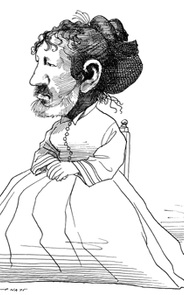 During the ceremony, an Edison “moving picture” captured Mrs. Grant on film, the first known instance of a woman who was First Lady being recorded in this manner. Although it is documented as being shown in nickelodeons and theaters at the time, prints of it no longer appear to be available. During the ceremony, an Edison “moving picture” captured Mrs. Grant on film, the first known instance of a woman who was First Lady being recorded in this manner. Although it is documented as being shown in nickelodeons and theaters at the time, prints of it no longer appear to be available.
Relationship with former First Ladies
As a former First Lady, Julia Grant maintained closer personal relationships with other First Ladies than any other presidential spouse had since Dolley Madison. While cordial with, if not close to Lucy Hayes, she reached out to Lucretia Garfield following her husband’s 1881 assassination, and maintained a correspondence with her into the latter’s widowhood. Despite their husbands being of different political parties, she seemed especially fond of Frances Cleveland, visiting with her both in the White House and in New York City, when the younger woman lived there between the two non-consecutive terms of her husband. While both were residents in New York, Mrs. Cleveland gave birth to her first child and Mrs. Grant sent her a warm congratulatory note, along with a gift for the baby. During her residency in Washington, D.C. Julia Grant was on close terms with Caroline Harrison and her daughter Mary McKee, who assisted as a White House hostess, and the former First Lady hosted a special reception for the latter in her Massachusetts Avenue home. She was waiting in her closed carriage on the north driveway of the White House on McKinley’s 1897 Inauguration Day, there to welcome Ida McKinley. She was a frequent guest at state dinners as Mrs. McKinley’s guest.
Perhaps the most unlikely of Julia Grant’s friendships was with Varina Davis, the widow of Confederate President Jefferson Davis. Mrs. Grant had prompted their relationship in 1893, when she paid an impromptu visit on Mrs. Davis, discovering they were staying in the same hotel. The two often took carriage drives together to the site of Grant’s Tomb, to watch its building progress. The former Confederate First Lady proved particularly comforting to the former First Lady of the United States when she became enraged over criticism of Grant in various publications.
Media Accessibility
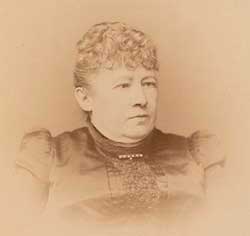 In her later years, Mrs. Grant granted an unprecedented number of newspaper interviews for attribution, certainly more than any other former First Lady to that point. She did not do so, however, to recollect her own glory days in the White House, but as a representative of her late husband. As a means of honoring his beliefs and opinions, she often made herself available to writers and reporters seeking the likely viewpoint of the late President on various matters, but largely Civil War recollections or on issues affecting veterans. Mrs. Grant gave her last press interview in 1901, while staying at the Fifth Avenue Hotel, with what the reporters called, “"a certain quaint simplicity and a charming, almost childlike candor,” the topic being the radical development of New York City since the Civil War era, when she had first gone there. In her later years, Mrs. Grant granted an unprecedented number of newspaper interviews for attribution, certainly more than any other former First Lady to that point. She did not do so, however, to recollect her own glory days in the White House, but as a representative of her late husband. As a means of honoring his beliefs and opinions, she often made herself available to writers and reporters seeking the likely viewpoint of the late President on various matters, but largely Civil War recollections or on issues affecting veterans. Mrs. Grant gave her last press interview in 1901, while staying at the Fifth Avenue Hotel, with what the reporters called, “"a certain quaint simplicity and a charming, almost childlike candor,” the topic being the radical development of New York City since the Civil War era, when she had first gone there.
By maintaining a public profile, however, the former First Lady also made herself vulnerable to media criticism and speculation. It was suggested that she was greedy
when it was learned that Dr. Douglas, the physician who had seen the former President through his final illness, himself became ill but was too indigent for care in anything but welfare hospital. Julia Grant countered this by pointing out that he had been paid a far greater amount than he had billed for his services, as a generous gesture on her part for his devotion. When it was learned that her namesake granddaughter was engaged to member of the Russian nobility, the press crafted a story based on “Grandmother Grant's despair over the match,” despite the fallacy of the charge.
Life in California
During the years of her widowhood, three of Julia Grant’s four children settled in California and it sparked her naturally adventurous spirit to follow them. She joined her son Buck and his family during their excursion west, arriving in San Diego on October 27, 1893.
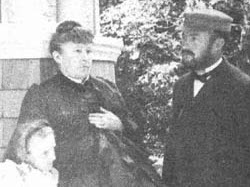 Both Buck and Jesse Grant would settle in San Diego, and the former First Lady began to spend the winter months of the next several years in southern California between there and Santa Barbara, where her daughter Nellie was, by then, living. In an era when life on the west coast was being advertised in glowing advertising brochures as a blend of the rugged, outdoor life of the idealized “Old West,” and a healthy retreat affording a daily diet of year-round fresh fruits picked from trees, substantial press coverage of the presence there of General Grant’s widow prompted its further validation as a civilized region to establish residency for those Americans seeking such incentive. Both Buck and Jesse Grant would settle in San Diego, and the former First Lady began to spend the winter months of the next several years in southern California between there and Santa Barbara, where her daughter Nellie was, by then, living. In an era when life on the west coast was being advertised in glowing advertising brochures as a blend of the rugged, outdoor life of the idealized “Old West,” and a healthy retreat affording a daily diet of year-round fresh fruits picked from trees, substantial press coverage of the presence there of General Grant’s widow prompted its further validation as a civilized region to establish residency for those Americans seeking such incentive.
The Spanish-American War
Influenced by the yellow journalism of William Randolph Hearst in 1898, Julia Grant became the most prominent name to head a list of other American women urging the public to lobby Congress and prompt the President into military intercession against reported atrocities committed by Spanish troops against the Cuban people. She also attempted to get the First Lady Ida McKinley to sign as well, an effort that failed. Once the Spanish-American War was underway, Mrs. Grant became one of three leaders of the Women's National War Relief Association, mobilizing voluntary efforts across the country to gather or donate necessary clothing and medical supplies for American troops fighting in Manila, the Philippines, which were then sent aboard a hospital vessel. It was the first time a former First Lady assumed a formal title for a large, national effort and so overtly undertook a public endeavor. "I must keep active to be contented. I no longer take a very great interest in social pleasures,” she explained at the time.
A National Identity
By her life’s end, Julia Grant offered an embodiment of broad national identity, rather than being narrowly defined by the strong regionalism that still marked the identity of most public figures at the turn of the 20th century. It was borne out by the facts of her biography. Daughter of a small-town southern father with colonial ancestors and a mother of immigrant parentage from the urban north, she was born and raised in a pro-slavery rural Missouri yet lived much of her early life in anti-slavery Illinois. During the Civil War, she lived in both northern and southern encampments with her husband. Acculturated as a southern, she stalwartly supported his charge of the Union Army of the northern states. She also lived in the mid-Atlantic states of New Jersey and Pennsylvania. As a former First Lady, she established herself as a quintessential New Yorker, a familiar presence in the city’s stores and theaters. Julia Grant was also, chronologically, the first First Lady to travel the transcontinental expanse of the United States to the western states, spending part of several consecutive years in California. In interactions intended for public dissemination, she consciously fortified her unique national symbolism by refusing to compare the quality of life of one region against the other, or to criticize former Confederate sympathizers. She often referenced “our country” in her observations on the evolving American culture.
Washington, D.C.
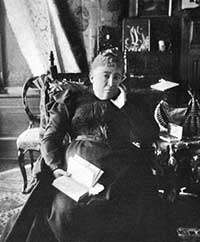 Mrs. Grant spent the summer of 1889 in Europe, based in Vienna with her son Fred, who’d been named by President Harrison as ambassador to Austria-Hungary. Upon her return to the U.S, she sold her New York brownstone for $130,000. When her daughter separated from her British husband and then permanently returned to the United States, Julia Grant went to live with her in Washington. After a brief lease residency at 2018 R Street, NW, the former First Lady and her daughter bought a marble-front mansion at 2111 Massachusetts Avenue that had belonged to Senator George F. Edmunds, of Vermont (the former still stands, the latter was demolished and a hotel now stands on the site). With her independent wealth, Mrs. Grant was able to indulge her love of entertaining, hosting an open reception every Tuesday afternoon during the winter social season months. Although suffering from rheumatism, she forced herself to remain standing to greet guests and refused to be seen using a wheelchair presented to her as a gift. Mrs. Grant spent the summer of 1889 in Europe, based in Vienna with her son Fred, who’d been named by President Harrison as ambassador to Austria-Hungary. Upon her return to the U.S, she sold her New York brownstone for $130,000. When her daughter separated from her British husband and then permanently returned to the United States, Julia Grant went to live with her in Washington. After a brief lease residency at 2018 R Street, NW, the former First Lady and her daughter bought a marble-front mansion at 2111 Massachusetts Avenue that had belonged to Senator George F. Edmunds, of Vermont (the former still stands, the latter was demolished and a hotel now stands on the site). With her independent wealth, Mrs. Grant was able to indulge her love of entertaining, hosting an open reception every Tuesday afternoon during the winter social season months. Although suffering from rheumatism, she forced herself to remain standing to greet guests and refused to be seen using a wheelchair presented to her as a gift.
Women’s Suffrage:
Mrs. Grant’s first known awareness of the growing suffrage movement occurred during the 1872 election when perhaps its well-known leader Susan B. Anthony offered her public support of President Grant’s second term, over his rival Horace Greeley. It earned her high regard for Miss Anthony personally, if not yet for effort to ensure women’s equal right to vote. The concept of political equality was not one Julia Grant initially grasped as necessary, having been engaged in political discussion and debate first with her father and then with her husband. She was curious about 1872’s presidential candidacy of Victoria Woodhull but remained bewildered. It was as a widow, while sharing a luncheon with Susan. B. Anthony that Julia Grant fully grasped why women of all socioeconomic and educational levels be granted the right to vote; from then on she was an avid suffragist.
She saw no conflict between giving women the right to vote and they continuing to manage the home and family,” urging them to “look your prettiest” and “let your husbands feel that his home is his castle.” Unlike many others at the time, although Mrs. Grant observed that, "So many men go astray now; there must be something wrong," she never believed it had anything to do with granting women more equality, including the right to vote. In fact, although she offered young Americans traditional advice on how to create a happy marriage and home, she addressed the matter to both genders: “First of all be obedient and loving sons and daughters. As husbands & wives be loyal and strive to keep the mistletoe evergreen in your homes…If you do this wisely we will have a race of brave, noble and true men and women. “
first First Lady Memoirs:
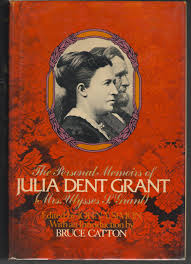 Apart from her numerous press interviews, Julia Grant also proved a talent for writing. As a widow she began to pen a number of short article for popular, national magazines and syndicated newspaper stories. In April of 1897, for example, she contributed a Sunday World piece about her husband in conjunction with the Grant’s Tomb dedication. Much of her other work, however, focused on the human side of current events, offering advice on topics ranging from raising children to become responsible spouses, honoring Abraham Lincoln, enduring the separation from husbands and fathers serving in the Spanish-American War, and why voters should support the Republican Party. Apart from her numerous press interviews, Julia Grant also proved a talent for writing. As a widow she began to pen a number of short article for popular, national magazines and syndicated newspaper stories. In April of 1897, for example, she contributed a Sunday World piece about her husband in conjunction with the Grant’s Tomb dedication. Much of her other work, however, focused on the human side of current events, offering advice on topics ranging from raising children to become responsible spouses, honoring Abraham Lincoln, enduring the separation from husbands and fathers serving in the Spanish-American War, and why voters should support the Republican Party.
Initially, Mrs. Grant considered publishing her correspondence with Ulysses Grant exchanged over the course of their marriage. After witnessing the enormous success of his book, however, Julia Grant soon enlarged her efforts beyond magazine articles to her own memoirs, chronicling her full life. The highly conversational nature of the work, eventually published in 1975, is due to the fact that the former First Lady entirely dictated them to Mary McAuliffe, who doubled in her service as both maid and secretary.
She announced her completion of a first draft of memoirs to reporter F. G. “Carp” Carpenter. In 1894, however, she expressed ambivalence about "submitting it to the world and [thought] of the criticism, controversy and misunderstanding which it might provoke, I shrink from the final task of publication." Offered the substantial advance of $25,000 by Elliott Shepard, upon completion of what was her first version, she responded with ambivalence. While she claimed that in its current state the manuscript was too personally detailed and she did indeed rewrite it, her hesitancy may have also had to do with not getting as high an offer as she wished. In a November 12, 1901 letter to Andrew Carnegie, the former First Lady perhaps overestimated the value of her memoirs as a potential product in the world of publishing. By asking him to purchase it for publication at the price of $125,000, she sought to strike a deal nearly as great as that of her late husband: “I wish now to sell it outright. I cannot undergo the anxiety and care of publishers' exactions. I fear you will think I value the manuscript at a high figure...I assure you it is a very valuable little book, costing me months of labor, and as well giving me weeks and months of real pleasure, I living over again as it were my historic and happy, happy past. I feel too…I am addressing one who can afford to be generous…” Carnegie decided to pass the memoirs. She died before determining how to proceed with her book. It was published 73 years after her death.
Canada:
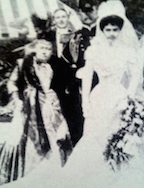 Julia Grant spent her final summers in Ontario, Canada in the town of Cobourg, where her daughter rented a large red brick house with a lake view. There she attended the 1901 wedding of one of her granddaughters to a cousin of President Theodore Roosevelt. Through her son Fred, who served on the New York City Police Commissioners board with Theodore Roosevelt, the former First Lady first met the future President in New York. She would later dine with Roosevelt in Washington, following his being made Assistant Navy Secretary in 1897, and then Vice President in 1901. In Canada, in the fall of 1902, she developed severe bronchitis, with heart and kidney complications and in October was returned to her home in Washington. Julia Grant spent her final summers in Ontario, Canada in the town of Cobourg, where her daughter rented a large red brick house with a lake view. There she attended the 1901 wedding of one of her granddaughters to a cousin of President Theodore Roosevelt. Through her son Fred, who served on the New York City Police Commissioners board with Theodore Roosevelt, the former First Lady first met the future President in New York. She would later dine with Roosevelt in Washington, following his being made Assistant Navy Secretary in 1897, and then Vice President in 1901. In Canada, in the fall of 1902, she developed severe bronchitis, with heart and kidney complications and in October was returned to her home in Washington.
Death:
Julia Grant died at her Washington, D.C. home on 14 December 1902 in the presence of her daughter. She was 74 years old.
Funeral
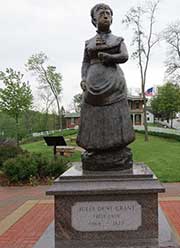 President Theodore Roosevelt attended the Washington, D.C. funeral services of Julia Grant at the Metropolitian Methodist Church, a notable milestone in First Lady history. Although incumbent President Zachary Taylor had been in attendance at the 1849 funeral of former First Lady Dolley Madison, his presence and eulogy to her was only anecdotally noted; he was one of numerous public officials who appeared at service in St. John’s Church, a brief walk across the street from the White House. In contrast, President Roosevelt’s effort to appear at Julia Grant’s funeral made national headlines. It was as much a tribute to the memory of the venerated General Grant as it was to his wife. President Theodore Roosevelt attended the Washington, D.C. funeral services of Julia Grant at the Metropolitian Methodist Church, a notable milestone in First Lady history. Although incumbent President Zachary Taylor had been in attendance at the 1849 funeral of former First Lady Dolley Madison, his presence and eulogy to her was only anecdotally noted; he was one of numerous public officials who appeared at service in St. John’s Church, a brief walk across the street from the White House. In contrast, President Roosevelt’s effort to appear at Julia Grant’s funeral made national headlines. It was as much a tribute to the memory of the venerated General Grant as it was to his wife.
The incumbent President’s attendance at the former First Lady’s funeral suggested a growing respect for the status of presidential spouse; four years later, he also travelled to Ohio to attend the funeral of Ida McKinley. This new appreciation for the First Lady role was underlined the day after her funeral, in a eulogy of Julia Grant made by minister Frank Bristol, in which she was paired with Martha Washington as examples of women who had earned public respect not simply by virtue of their marriage but their individuality.
Burial:
On December 21, 1902, Julia Grant was buried beside her husband at “Grant’s Tomb” on Riverside Drive in New York. While the ceremony was not opened the general public, it did mark the first burial rites of a First Lady treated as a quasi-official federal event, with local Army and Navy officers in attendance, along with her four children.
|